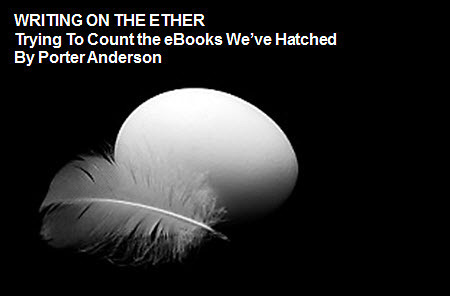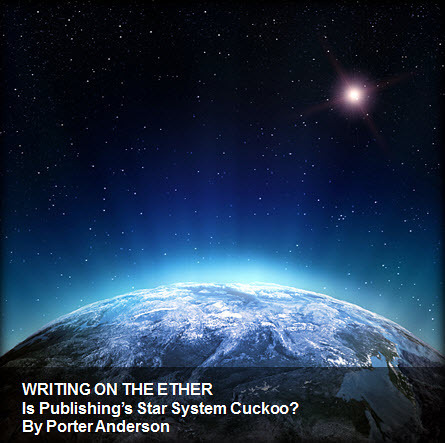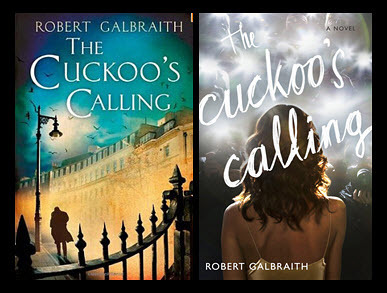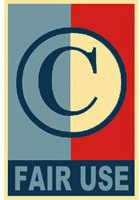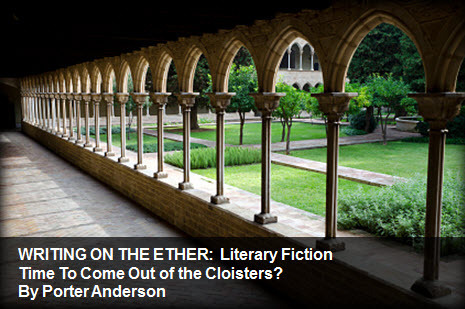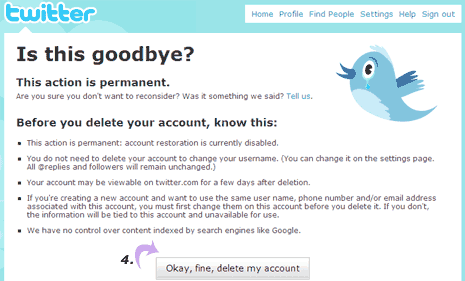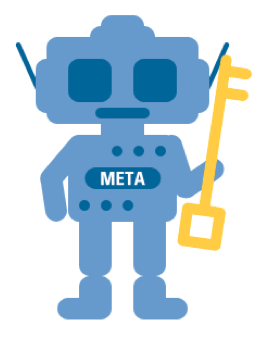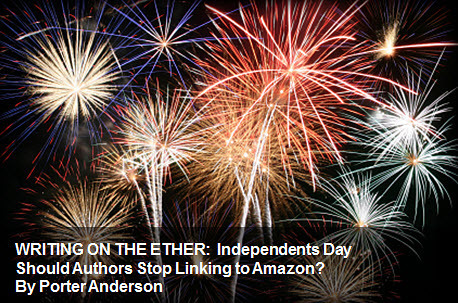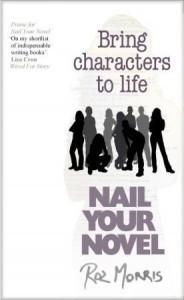Jane Friedman's Blog: Jane Friedman, page 174
July 30, 2013
Better Than Fall Back: The Small Press Option by Shirley Showalter
Today’s guest post is by Shirley Hershey Showalter (@shirleyhs), author of the memoir, Blush, to be released in September 2013.
“Publishers have not yet grasped the sea change in the world of authors. Authors in this giddy time have not yet grasped the true cost of going it alone.”
—Donald Maass, literary agent
In the 1950s, few women enrolled in college. When they did, their parents sometimes explained to the neighbors that education for girls was like an insurance policy. “Nancy will always have something to fall back on.”
Likewise, college students who apply to the Ivy League schools also apply to a B list of “fall back colleges.”
That’s the way many writers view the small press: something you swallow your pride to accept and then make the best of. For some of us, however, small presses actually serve as our first, or even best, option.
Here are three case studies that show why.
Richard Gilbert & Michigan State University Press
 Richard Gilbert worked as a book publicist at Indiana University Press, and then as a publicist and marketing manager at Ohio University Press/Swallow Press, so he has an appreciation for the advantages of small presses. His memoir, Shepherd, releases in May 2014.
Richard Gilbert worked as a book publicist at Indiana University Press, and then as a publicist and marketing manager at Ohio University Press/Swallow Press, so he has an appreciation for the advantages of small presses. His memoir, Shepherd, releases in May 2014.
Was a university press your first choice? Why or why not?
During the seven years of working on Shepherd, I pitched trade presses and agents. I ended up getting rejected in all categories, including university presses, but accepted by two university presses—making for a hard choice—and had close passes from some trade publishers and agents.
Unfortunately, I blew my best chances with two or three small trade presses fairly early in the process when my book wasn’t ready, but I couldn’t see that. There are so many manuscripts clamoring for attention, it’s basically one strike and you’re out, anywhere. If you just think your book is ready, it isn’t—you have to know it’s ready.
Beyond that, it’s harder to get an agent than to get a publisher; they are in business, a hard one, to find and to sell books to publishers on the promise that every man, woman, and child in America will want to read it. I exaggerate, but not by much.
What benefits do you see in publishing with a small press?
University presses usually have excellent copy editors, high production values, and tend to keep their books in print a long time. The latter reason is a real biggie with me, since a big trade house may give a book a year and then it’s gone. Like any publisher, university presses are looking for books that “fit their list,” which means their subject categories and often their geographical region.
It astounds me how many writers give up rather than try a university press. I knew a writer who had a great 9/11 story to tell, wrote a great proposal, and had it rejected in New York and gave up. “Why didn’t you try a university press, maybe Rutgers?” I asked. “Because,” she said, “I want to make my living as a writer.” I think my mouth fell open.
My saying all this makes university presses seem like pushovers and they’re not. For one thing, they are under tremendous financial stress as universities support them less and as the bookselling landscape changes so rapidly. But they’re still publishing books and looking for books.
What do you enjoy specifically about the press you are working with?
I appreciate the way the folks at Michigan State are a team. And I love my book’s cover and the way they involved me when they deadlocked between it and another cover; I got to break the tie.
The editor who acquired my book, Julie Loehr, responded to my proposal, read the manuscript and liked it, and then sent it to three outside readers. Such readers are a difference at university presses, stemming from their practice of publishing scholarly books. I loved who Julie picked. One person was supportive but taciturn, while the other two said all kinds of ecstatic things and identified one shared concern. The epilogue was tripping them up, and though they couldn’t say why, I knew that a technique I had tried wasn’t working. Julie was really low key. She said, “Do you want to take a look at it? It’s your book.” I did, and am grateful for that process.
Any downside? What kinds of books and authors do not fit university presses?
University presses don’t have big advertising budgets. One of the reasons they like and look for niche books is because they can find and market to niches. They have been credited with keeping short stories alive, not to mention providing crucial life support for poetry. It takes a ton of money to market bestsellers, but thankfully that’s not the only book market. A trade publisher might turn away from a book that’s not going to sell tens of thousands copies, whereas a university press may publish one that has prospects of selling 3,000 or fewer.
A rule of thumb is that you need an agent for trade houses, whereas generally speaking university presses don’t like dealing with agents. They will do it, and an agent can help improve your contract—university presses’ boilerplate contracts can be too one-sided, excessively favoring the publisher—but university presses are used to working directly with authors. I joined the Author Guild for help with my contract, and I recommend the organization.
Eleanor Vincent & Dream of Things
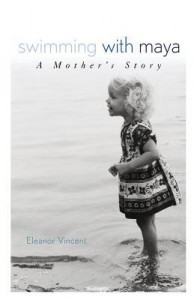 In July 2013, during a special promotion, Eleanor Vincent’s memoir Swimming with Maya became an Amazon bestseller, edging out Sheryl Sandberg and Tina Fey.
In July 2013, during a special promotion, Eleanor Vincent’s memoir Swimming with Maya became an Amazon bestseller, edging out Sheryl Sandberg and Tina Fey.
Did you consider the Big Five? Did you try them before deciding on a small publisher?
I went through the traditional publishing process initially. My former agent, Laurie Harper, sold my book on the basis of a proposal and sample chapters. We tried all of the Big 5, and I have a file full of beautiful rejections—editors loved the writing but sales and marketing could not see a market. Ultimately, Swimming with Maya was published in 2004 by Capital Books, an imprint of International Publishers Marketing. IPM provides distribution and marketing services for a number of smaller presses.
It was a beautiful hardcover book priced at $28. Despite garnering favorable reviews and quite a lot of publicity (I was interviewed on CNN and several local TV shows, and featured in many articles), Swimming with Maya sold tepidly and slowly. In all, I think we sold about 2,000 books before Capital closed its doors in 2010.
They kept the book on their backlist, but did no active promotion after the first half of 2004. Because it never went into paperback, it was not available to book clubs. I see that as a huge factor in the trajectory I am describing. Book clubs are the ideal forum for Swimming, which I discovered as I began speaking to the few that would read a hardback and invite the author for tea!
When I heard that Capital was closing and would be pulping the remaining copies, I looked into self-publishing. Laurie Harper was no longer my agent, but she advised me to consider a print-on-demand version of the book. I also talked with the Authors Guild about their “Back in Print” program, which provides a way for authors to keep their books available on a print-on-demand basis, but with very limited formatting. I balked when I realized that I could not keep the book’s beautiful cover using their program, and that if I went with AG, that would limit my options going forward.
Meanwhile, the whole publishing landscape had changed. Social media was becoming the way to build an author platform and lots of new options for publishing, including very small companies like Dream of Things were springing up. As luck would have it, a friend, Madeline Sharples, had a memoir out, Leaving the Hall Light On, which was suddenly dropped when her very small publisher also closed. She found Mike O’Mary, publisher at Dream of Things, and he brought out a paperback and e-book version of her book. Madeline offered to e-introduce me to Mike. He read Swimming and loved it, and agreed to reissue it in formats that are much less expensive to produce and sell than a hardcover edition.
Did you consider self publishing?
Frankly, self-publishing never appealed to me. I am a writer with a corporate day job. Any time or energy I have must go into my writing. I lack the skills and interest to deal with gnarly things like technology glitches and distribution.
What I instantly loved and recognized in Mike was someone who was passionate about books and my genre—narrative nonfiction, including memoir and personal essays. That’s what I love, read, and write. I read some of Mike’s essays and found a kindred spirit who happened to have the skills and interests in the mechanics of publishing that I lacked. I observed what he was doing to promote Madeline’s book and knew he would do a great job with mine.
I wanted someone to help spearhead the marketing effort as well. Mike has been terrific in that department. He’s found the right virtual venues for promotion, and the latest BookBub promotion shows how well his approach works. In one weekend, we’ve sold more e-books than Capital sold in hardcover over 6 years! And this is not to mention the 12,000 downloads that occurred before this latest promotion.
Meanwhile, I’ve built a Facebook following and a better platform to display my blogs. (I use other social media as well like Linkedin, Twitter, and Tumblr, but Facebook has been the best forum, and the easiest to use.)
I think this story illustrates the immense changes in publishing over the last decade, and the opportunities for writers with good books to sell them through smaller, boutique presses. Had I given up in 2010, Swimming with Maya would have disappeared.
How and why have you focused on boosting Kindle sales? [answered by Mike at Dream of Things]
Mike: I believe that a good book will generate its own momentum if you can get it into the hands of readers and get some word-of-mouth going. My solution is to release the e-book early (simultaneous with or shortly after the print edition), price the e-book aggressively, and then promote the heck out of it.
One of the ways I promote it is via websites and e-newsletters that target e-book readers. In a recent promotion that I advertised via BookBub, I sold 3,000 copies of Swimming with Maya in three days. Granted, it was at a promotional price of 99 cents (versus a regular price of $2.99), but the ad more than paid for itself, and there were many other benefits. The book moved way up in the rankings for several days, to the No. 1 memoir in the Kindle store, and to No. 12 out of all e-books in the NOOK store. Based on past promotions, I expect to see higher-than-average sales levels for the next several weeks at the e-book’s regular price of $2.99. I also expect to see more reader reviews, and because of all the paid downloads, Swimming with Maya will now be featured on the pages of other e-books under the “Customers Who Bought This Item Also Bought” heading—which amounts to free advertising. So lots of good things happen when you get the e-book out there.
BookBub is selective. You essentially apply to be able to advertise with them. Quality matters. Swimming with Maya has quality blurbs from many reviewers, writers, and subject matter experts, plus about 50 reader reviews on Amazon with an average rating of 4+ stars.
My Story With Herald Press
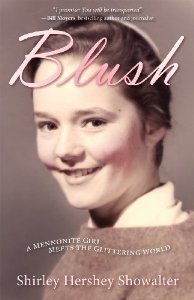 Like Richard and Eleanor, I chose a small press for my memoir, Blush—a publisher for the Mennonite Church USA and Canada. Why?
Like Richard and Eleanor, I chose a small press for my memoir, Blush—a publisher for the Mennonite Church USA and Canada. Why?
I was a rookie without previous book publishing experience in 2007 when I attended the Santa Barbara Writers Conference. I first heard the word “platform” there. I learned that finding an agent and then a publisher can take years and that the odds are stacked against the writer. That was before the tsunami of self-publishing, and also before e-books took off.
I might have given up the dream after that conference, but I kept on writing short personal essays and winning literary awards that included publication in the Kalamazoo Gazette. I was a fairly early adopter of social media also.
If I hadn’t known Amy Gingerich at Herald Press, I might have looked elsewhere. Amy inspires confidence in everyone she meets and has the kind of smarts you want in an editor. We inked a book deal in August 2011 on the basis of a proposal, not a manuscript (another advantage).
Here’s an incomplete list of what Herald Press has done for me:
gave me a small advance
supported me with two editors and two proofreaders
allowed me to hire my own developmental editor
procured ISBN numbers, set up Amazon and Goodreads author pages
provided professional book design, including a cover almost everyone loves as soon as they see it
included a (small) marketing/advertising budget, including a full-page ad in the denomination’s magazine
provided a professional publicist who sent galleys to 49 media outlets, wrote an excellent press release, has responded to every e-mail, and will support the launch tour with advance copies and media contacts
offered contacts with Ingram, Amazon, Publishers Weekly (which will review the book), Booklist, etc, all by the four-month-in-advance deadlines
sent galleys to 10-15 endorsers
featured me at their bookstore during a recent convention
offered staff support and a professional videographer to do a book trailer
worked with independent bookstores at five locations to support my book tour
There’s another major advantage: I’m a life-long Mennonite, my story centers on the meaning of being Mennonite, I was the president of a Mennonite college for eight years, and most of the people who know me best and care about me most are Mennonite.
Every author starts with a core of most likely readers. Mine is Mennonite, literary, and academic. I want to reach far beyond that core, but the best way to do so, I believe, is to excite my first readers. If buzz doesn’t happen there, it’s not likely to happen anywhere.
You might be amazed at all the small presses still going strong. Here’s one place to search for them, and here’s another. You can also research them in Writer’s Market.
When asked the difference between a small press and a large one, Margaret Benefiel, author of three books, including The Soul of a Leader (Crossroad Publishing Company), quoted one of her friends: “With a big press you get visibility; with a small press you get love.”
And as with love in real life, we are not searching for a fall back. We want the real thing.
The post Better Than Fall Back: The Small Press Option appeared first on Jane Friedman and was written by Shirley Showalter.
July 25, 2013
WRITING ON THE ETHER: Which Has More Impact? The Chicken or Self-Publishing? by Porter Anderson
Table of Contents
Trying To Count the eBooks We’ve Hatched
“Without Gatekeepers Who Need To Publish Blockbusters”
“The Analysis…Is Already Weighted Against eBooks”
A Barnyard by Moonlight
Trying To Count the eBooks We’ve Hatched
As the effluvium gathers today, this is Writing on the Ether No. 100. Thank you for reading this hot air, hosted so faithfully by our great friend and colleague Jane Friedman.
And as the summer wears on, two forces are circling each other in the publishing hen house.
Our biggest problem? We don’t have a good enough picture of either. The chicken is crossing the road blindfolded.
The change is self-publishing, and my friends, it is huge.
Barbara O’Neal is not wrong.
E-book sales are headed in only one direction: that is up.
Philip Jones is not wrong, either. To consider the timeliness and specificity of their messages to us, we need to hear from each. Jones and O’Neal have something important to say this week. Back to Table of Contents
At her peak, Oprah avgd 12-13m viewers/week, and books were a side thing. Goodreads now has 20m users, ALL readers. #dothemath #discovery — Guy L. Gonzalez (@glecharles) July 23, 2013
If publishers can’t figure out how to leverage Goodreads, that’s not a problem w/ online #discovery, it’s a problem w/ marketing skills. — Guy L. Gonzalez (@glecharles) July 23, 2013
“Without Gatekeepers Who Need To Publish Blockbusters”
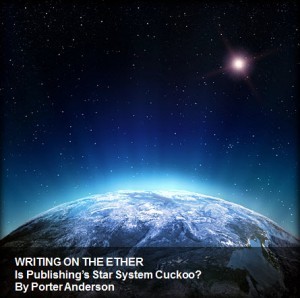 Last week here in Writing on the Ether: Is Publishing’s Star System Cuckoo?, we looked at the star system and the blockbuster dependency on which many traditional elements of the industry! the industry! seem to be running. This is part of what O’Neal is getting at in her new post when she writes about:
Last week here in Writing on the Ether: Is Publishing’s Star System Cuckoo?, we looked at the star system and the blockbuster dependency on which many traditional elements of the industry! the industry! seem to be running. This is part of what O’Neal is getting at in her new post when she writes about:
…the ability to price, package and reach your own audience without gatekeepers who need to publish blockbusters. It’s a tremendous amount of creative freedom that has already created some new sub-genres because there was no editor or marketing panel to say, “We don’t think stories about post-high school will sell.”

Barbara O’Neal
And one of the things that makes this RITA Award-winning author’s The Sea Change of Self-Publishing at Writer Unboxed so significant is that her article comes from the deepest, pinkest heart of the romance world. Her post is a look-back at the Romance Writers of America’s (RWA) national conference in Altanta last week. Surprised? Me, too. Surely, if anybody understands self-publishing, it’s the Shirtless Men Kissing Beautiful Women crowd. But as we learn from our good colleague O’Neal, the “sea change” at RWA this year meant “the swell was washing over every aspect of the conference.”  She writes of a serious power shift:
She writes of a serious power shift:
For the first time I can remember, ever, editors and agents were wooing authors. One notable workshop featured editors from major houses presenting the things publishers could do for authors. Meanwhile, speakers on the self-pub track, assembled single-handedly by self-publishing millionaire Barbara Freethy, packed the room. The ballroom.
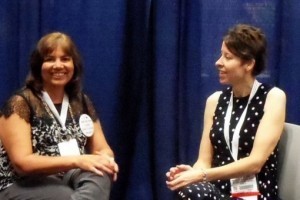
Barbara Freethy, left, and agent Kristin Nelson at BEA on May 30
Barbara Freethy, of course, is the three-million-copy-selling author of 34 books who, as we reported at Publishing Perspectives has just signed with Hugh Howey’s agent Kristin Nelson. O’Neal tells us of comments about self-publishers’ earning capacity from author Bella Andre, a Freethy and Howey associate in the #Indie6 group of “Indie Bestsellers” who took a booth together at BookExpo America (BEA) this year. O’Neal adds:
Amazon, Apple, Kobo, and Barnes and Noble sent their teams to hold meetings, present workshops, and even offer a wine-tasting. Authors were wooed here, too—by merchandisers and editors for the indies.
 Last spring in New York City, we saw the same upswing in the self-publishing dynamic as Writer’s Digest Conference East staged a daylong conference-within-a-conference on self-publishing. The same will occur in Los Angeles on September 27, when I’ll be moderating a panel with Amazon’s Jon Fine and WriterCube’s Kristen McLean in Writer’s Digest Conference West’s self-publishing day program. O’Neal’s piece is enriched by her frank comments about how far apart many authors are on the issue. She writes that despite the high-profile stories of strong (monthly!) income and creative control:
Last spring in New York City, we saw the same upswing in the self-publishing dynamic as Writer’s Digest Conference East staged a daylong conference-within-a-conference on self-publishing. The same will occur in Los Angeles on September 27, when I’ll be moderating a panel with Amazon’s Jon Fine and WriterCube’s Kristen McLean in Writer’s Digest Conference West’s self-publishing day program. O’Neal’s piece is enriched by her frank comments about how far apart many authors are on the issue. She writes that despite the high-profile stories of strong (monthly!) income and creative control:
Many [authors] are very frightened. Some haven’t made any money at all—and the reasons are as numerous as in any other field. Some have a bad product. Some have terrible packaging…or a non-existent understanding of web marketing. Other authors are just afraid. Afraid of change. Afraid of looking foolish if they try it and fail. Afraid they won’t be taken as seriously if they self-publish. Afraid to leap.
The Writer Unboxed community, as usual, has no fear of leaping into generous, lively discussion of the self-publishing phenomenon with O’Neal.

Donald Maass
Particularly interesting are comments from agent Donald Maass, who on two days this week at the site has written to authors, “The industry needs you more than you need it.” Of special interest to those who have followed our coverage of the ebook royalty debate (see A Major Publisher Jumps the Shark), Maass now writes in a comment: Surprised? Me, too. Surely, if anybody understands self-publishi
Publishers sooner or later will escalate e-book royalty rates. Believe it. It will happen. It’s already happening around the edges. It’s called competition. And as their royalty rates rise, their bad deal for authors–compared to the true margins of do-it-”yourself”–will start to look not so bad. Publishers have not yet grasped the sea change in the world of authors. Authors in this giddy time have not yet grasped the true cost of going it alone.
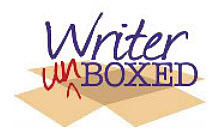 And as for the trickiest part of the self-publishing debate? We simply don’t know how many authors are trying to self-publish. And so we certainly don’t know how well they’re doing. Our information is frequently anecdotal, guesswork, extrapolation. Throughout the comments that follow O’Neal’s post, you read folks mentioning “the writers I know have told me…” And this is because the self-publishing dynamic is, by definition, non-aligned, neither easily counted nor categorized, impossible for standard survey and research operations to fully track, and as broadly decentralized as traditional publishing once was concentrated in New York.
And as for the trickiest part of the self-publishing debate? We simply don’t know how many authors are trying to self-publish. And so we certainly don’t know how well they’re doing. Our information is frequently anecdotal, guesswork, extrapolation. Throughout the comments that follow O’Neal’s post, you read folks mentioning “the writers I know have told me…” And this is because the self-publishing dynamic is, by definition, non-aligned, neither easily counted nor categorized, impossible for standard survey and research operations to fully track, and as broadly decentralized as traditional publishing once was concentrated in New York.  How many are “succeeding?”—success for one author may be something else to another. With this new, entrepreneurial energy comes a diffusion of goals and proving points; the traditional model’s standards for “success” may not all apply. This is one reason I’m looking forward to another moderating gig at the CONTEC Frankfurt 2013 conference on October 8, when we’ll be addressing the implications of self-publishing for traditional publishing, itself. In the meantime, O’Neal brings us candor and optimism amid the quandaries:
How many are “succeeding?”—success for one author may be something else to another. With this new, entrepreneurial energy comes a diffusion of goals and proving points; the traditional model’s standards for “success” may not all apply. This is one reason I’m looking forward to another moderating gig at the CONTEC Frankfurt 2013 conference on October 8, when we’ll be addressing the implications of self-publishing for traditional publishing, itself. In the meantime, O’Neal brings us candor and optimism amid the quandaries:
My prediction for the coming year is that we’re going to see more and more big name authors jumping into the [self-publishing] waters—and finding great success. I also predict a lot of new writers are going to go with their creativity and their guts and create new genres and subgenres all over the place.
And before that golden egg gets fully away from us, let’s look at the other major part of the puzzle we can’t yet figure out: those ebooks. Back to Table of Contents
@dearauthor @Inkstone @lydiahirt I can wear leather chaps? — Don Linn (@DonLinn) July 24, 2013
“The Analysis…Is Already Weighted Against eBooks”

Philip Jones
The Bookseller’s editor Philip Jones in his new FutureBook gets the egg rolling this way:
There is talk of sales plateauing at around 30% [in the US], as in the UK they appear to have coalesced at around 25%. Except, I’m not really convinced by this. There is a sense that ebook sales are “booming” and yet there is no data to back this up.

Sam Missingham
Jones is aided, as he notes, by an earlier write at The FutureBook by his colleague Sam Missingham, In search of a happy ending, in which she wrote of some in publishing who want to say, “We’ve got digital licked. Nothing to see here, please move along.” While you need to read Missingham’s calculations of what can be known and deduced, part of her concern is captured in this sentence:
A market that has gone from zero to conservatively 706 million ebooks in 5 years in the US is not plateauing.
And she adds:
The number of self-published authors will continue to grow; in general their ebooks are cheaper; we will see more rapid growth in unit sales here.
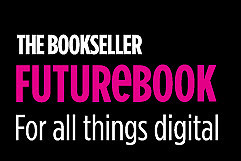 Jones, in this week’s The invisible e-book, then takes up the point—not unfamiliar to Ether readers—that regular means of evaluating ebooks don’t include actual figures from the biggest players, from “the self-publishing market or of Amazon’s own digital publishing” because Seattle doesn’t report those numbers. The biggest force in the field holds its sales data private, as proprietary information. That’s a perfectly legitimate corporate tactic, but it keeps us from knowing what’s actually going on. What’s more, Jones adds, “The half-year data also does not take into account the significant boost the digital market may get this summer, or the impact of runaway bestsellers such as Fifty Shades—or, potentially, The Cuckoo’s Calling.” And this, emphasis his:
Jones, in this week’s The invisible e-book, then takes up the point—not unfamiliar to Ether readers—that regular means of evaluating ebooks don’t include actual figures from the biggest players, from “the self-publishing market or of Amazon’s own digital publishing” because Seattle doesn’t report those numbers. The biggest force in the field holds its sales data private, as proprietary information. That’s a perfectly legitimate corporate tactic, but it keeps us from knowing what’s actually going on. What’s more, Jones adds, “The half-year data also does not take into account the significant boost the digital market may get this summer, or the impact of runaway bestsellers such as Fifty Shades—or, potentially, The Cuckoo’s Calling.” And this, emphasis his:
But most importantly, the analysis, based on print book bestsellers, is already weighted against ebooks. The top-selling print books may not also be the top-selling ebooks.
Saw this bookshop in Bath UK – anticipating @MargaretAtwood in aug http://t.co/ZsObCMeflJ — LisaB (@beach650) July 10, 2013
This is the key. It almost certainly is not the case that the ebook market is a digital mirror to the print market. The point has been reflected in O’Neal’s write-up, as well, when she notes:
Romance novels are definitely at the forefront of the digital revolution. Erotica has long been read in ebook format, and now contemporary and new adult romances are rocking the digital lists. Other genres are doing quite well, however. Science fiction is growing, and mysteries are very strong. Sooner or later, there are bound to be cross-overs in literary and non-fiction.
What about a book trolley service on the trains? Foyles to open Waterloo station branch https://t.co/pKNYIsVFLR via @JuliaKingsford — Jonny Geller (@JonnyGeller) July 24, 2013
And in his own, parallel thinking, Jones goes past the frequent custom of looking at ebook activity in the market as a print-to-ebook translation of the main sellers in the standard market:
Almost all of the data we have about the ebook market is rooted in how ebooks are doing when compared to print books. When we talk about ebook growth what we have really been talking about is digital migration. I have now seen some data for the biggest selling standalone ebooks, and a different picture emerges. While we report that the average P to P+E ration [ebook to print+ebook ratio] is around 25% for books featured in the Top 50, for books that are ebook bestsellers, that percentage leaps, almost to 50%. This means for that some types of publishing, and certain styles of books, talk of a deceleration may seem way off.
Book News: Chuck Palahniuk Working On ‘Fight Club’ Sequel http://t.co/ZLYBZNOLn6 — NPR News (@nprnews) July 24, 2013
And now the probable breadth of that “invisible ebook” begins to emerge. Jones opens the door to the barn:
What we have so far failed to measure is ebooks that are ebooks first, be they self-published ebooks, or books that have simply outperformed in digital format. There are many, many, ebooks that are selling in the thousands that have little or no relation to the performance of their print book equivalent, if indeed they have one. They may be Amazon published, or released via an agent’s White Glove list; they may be part of a backlist digital list such as the Bloomsbury Reader, or put out by one of the growing range of front-list digital lists, such as [Little, Brown UK's] Blackfriars; or they may be self-published.
Jones is talking mostly about digital-first and/or digital-only material. Some of it lies unreported and untracked by standard means because many self-publishing authors don’t use ISBNs as identifiers for their ebooks. And it’s huge, of course. Like a parallel estate to the known terrain of major publishing and e-versions of traditional books, the native-digital ebook ranch is bustling along to different patterns of interest and engagement with its readers.  In a separate report Wednesday, Digital fiction to overtake paperbacks in 2014, says Nielsen (this one is behind The Bookseller’s news paywall), Jones looks at Nielsen’s optimistically titled “Understanding the eBook Consumer” report for July and sees the general lower price points of ebooks coupling with a decline in print revenues. He assesses the Nielsen report: “Sales of hardback and paperback novels are falling faster than sales of fiction ebooks are rising.” And that, needless to say, may be good for no one in publishing. But again, we don’t have a clear picture of what ebooks are doing. Such analysis is made without a complete view of the market. Back to Table of Contents
In a separate report Wednesday, Digital fiction to overtake paperbacks in 2014, says Nielsen (this one is behind The Bookseller’s news paywall), Jones looks at Nielsen’s optimistically titled “Understanding the eBook Consumer” report for July and sees the general lower price points of ebooks coupling with a decline in print revenues. He assesses the Nielsen report: “Sales of hardback and paperback novels are falling faster than sales of fiction ebooks are rising.” And that, needless to say, may be good for no one in publishing. But again, we don’t have a clear picture of what ebooks are doing. Such analysis is made without a complete view of the market. Back to Table of Contents
[image error]
One of VQR’s “instapoem” series, this one by Adam Chiles.
A Barnyard by Moonlight
The service provided us by O’Neal and Jones this week is like good flashlight work on a darkened landscape. Chicken and egg, ebooks and self-publishing seem to be functioning as mutually enabling forces. Because we have that 2007 date on which Amazon’s Kindle began making ebooks the viable force they are today, we probably can beat the old rap and tell, at least, which came first in terms of current dynamics.
I’m working on next month’s column for @TheToast. Trying to make a joke involving the word “remaindering” is tough, man. — Ginger Clark (@Ginger_Clark) July 24, 2013
Once the first successful e-reader was in place, the efficiency of digital production and the marketplace generated by the Kindle made self-publishing a workable avenue for many writers. This led other players—among them Kobo, iBookstore, Barnes and Noble’s troubled Nook effort, Smashwords, etc.—to begin working in the e-self-publishing space. Today, however, neither self-publishing nor ebook publication is adequately tracked or understood.
Guys… French kneading is really starting to make sense in my hands. And my bread is way better for it.
— Brett Sandusky (@bsandusky) July 23, 2013
We do know, thanks to O’Neal and others, that traditional publishing elements see reason to court the entrepreneurial author at one of the great US shrines of romance-category diversity, the RWA convention.
And we know, thanks to Jones, that we’re not crazy: when the print market contracts but we don’t seem to see ebook numbers taking up the slack, it very well may be because we dont’t have those ebook numbers. And we need them.
He says it well:
eBook sales are headed in only one direction: that is up. But this market is also broadening out, and taking on a life of its own. eBooks have a commercial reality that is different from the print market. What we interpret as a slowdown may actually be sales disappearing from sight.
What do you think? Do you feel hobbled by the uncertainties of markets and publishing paths about which we can only make educated guesses?
Back to Table of Contents
OK. Right now. On the back porch. This. pic.twitter.com/jjmA7H3y9M
— Paul Bogaards (@paulbogaards) July 24, 2013
Main image: LaserLens
The post WRITING ON THE ETHER: Which Has More Impact? The Chicken or Self-Publishing? appeared first on Jane Friedman and was written by Porter Anderson.
July 18, 2013
WRITING ON THE ETHER: Is Publishing’s Star System Cuckoo? by Porter Anderson
Table of Contents
“Only a few people can be stars”
The Technical Point: Honk If You Love Progress
OK, an Extra Technical Point: Why Are UK Covers Better?
The Cultural Point: Warped Speed in the Star System
“Only a few people can be stars”
When I interviewed the literary agent April Eberhardt on agent-assisted publishing for this week’s series of eight articles and essays at Publishing Perspectives, we were still a couple of days away from finding out who Robert Galbraith was.

April Eberhardt
Eberhardt said this to me, in some pretty prescient commentary I didn’t get to include in What Is a Literary Change Agent? And What’s Ethical?:
I’m tired of having missiles launched my way…I have authors whose manuscripts I’ve submitted 50 or 60 times and they all come back to me saying, “You know, this is wonderful, this is a great story, but we can’t take a chance on a debut author or new fiction or someone that we can’t guarantee is going to be a blockbuster.
The supposed Galbraith book, of course, was not a case of a publisher taking a chance on an unknown author—that case contravenes nothing of what Eberhardt is saying. Jo Rowling’s editor and publisher produced The Cuckoo’s Call.
More on @lonelyplanet RT @raffers: @dbhoops http://t.co/TdMaHY5KWd
— Sam Missingham (@samatlounge) July 18, 2013
More from Eberhardt, still, remember, before we learned that the pseudonym Galbraith belonged to Rowling:
You can probably sense some of my frustration. It’s just that there’s a lot of very good-hearted advocacy [for untested authors] that’s not being recognized by the industry.
I’d just like to interject here that I don’t hold the Galbraith/Rowling situation against Rowling or her colleagues. Nor do I think that the revelation of her as author of the book was the stunt that many have enjoyed claiming it was.

Philip Jones
If you’re running around shouting “Cuckoo Conspiracy!” at everybody, you need to hunker for a few minutes with one of our best commentators, The Bookseller’s Philip Jones, writing at The FutureBook. In A cuckoo in the nest, he debunks the stunt idea along with murmurings that the thing wasn’t selling well at all under the Galbraith name. Here:
There are those who think this was planned by the publisher, Little, Brown, but the lack of available stock suggests otherwise. Conspiracy theorists have also suggested the leak was a way of maximising publicity for the paperback edition of The Casual Vacancy, but that book remains outside the top 100 Kindle list, and is only out in paperback this week. It will be intriguing to see which title sells more when both are finally available nationwide in all formats, but I don’t see it as a given that publicity for The Cuckoo’s Calling will spark sales for The Casual Vacancy.
And here:
Some have suggested that the early performance of The Cuckoo’s Calling prior to the big reveal is an indictment of modern publishing, because it had sold so few. But The Cuckoo’s Calling was well reviewed, and sales were not out of step for a debut crime novel published in early summer by an unknown writer. According to figures I’ve seen, they were also not out of step with early sales of the first Harry Potter book.
Cool way to celebrate the 1st anniversary of me unsubscribing from @ebookfling is for them to start emailing me again without permission.
— Matt Mullin (@mrmullin) July 18, 2013
I especially appreciate Jones’ inclusion of the Blackfriars imprint (which did not produce the Rowling book), based as it is in a digital-first approach for literary fiction:
I am rooting for Markova, Buchanan and Anastas, as much as I am for Robert Galbraith.
I’m not saying it’s easy, but when writers whine abt how hard their jobs are I think they should try working on a road crew in a heat wave
— Don Linn (@DonLinn) July 18, 2013
(As an aside, I’ve worked on a road crew, in South Carolina, in a heatwave.)
— Don Linn (@DonLinn) July 18, 2013
And I understand, I think, Rowling’s interest in writing something out of the glare of the press. I’ve had a Tony-winning actor ask me to pretend to still be interviewing him in his dressing room on Broadway—”let them think you’re still in here”—so he could calm down before a performance. The brighter the glare, the more fearful of failure one can become.
But I do want you to get what Eberhardt was saying because that very star power is something we need to look at.
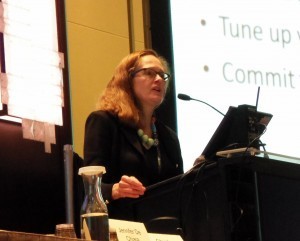
April Eberhardt speaks on new pathways to publishing at Writer’s Digest Conference East in New York in April. Photo: Porter Anderson
She goes on—and I’m annotating more than usual because at this point in our interview, Eberhardt and I were fully on record but in more chat mode than formal-quote mode:
That’s correct, I am not actually pursuing traditional work right now. [Meaning manuscripts the authors of which want to go straight to the Big Five and other major publishers.] Because in good conscience, I can’t say that the traditional publishing route is right for most authors. You know, it’s a star system. And unfortunately, only a few people can be stars. The rest get left in the dust.
That’s the concept I’d like you to look at today, if you will. Because for some reason, we’re not particularly good at saying what Eberhardt just said: star system.
You backseat sociologists can enjoy guessing why we don’t talk about this much. I’d put my money on (a) because it’s not always thought attractive to admit one wants to be a star, and (b) because to think of it as a star system can make it seem fully as daunting as it is, and who wants to be Sisyphus?
But as the Galbraith-Rowling revelation hit, two things came into very sharp focus, one technical and one cultural.
The Technical Point: Honk If You Love Progress
The technical point was, man, what a friend we have in ebooks.

Laura Hazard Owen
Laura Hazard Owen, our great colleague at Om Malik’s paidContent nailed that one in Print copies of J.K. Rowling book are super-scarce; eBay sellers cash in.
One signed copy of the book, Owen wrote, went for close to $2,000 on eBay. (Did somebody tell that buyer this isn’t a Harry Potter book?)
And as Owen wrote:
Print copies of the book are extremely scarce, because this demand hadn’t been anticipated. (That’s a strike against those who claimed that this was all a marketing stunt — along with Rowling’s PR firm’s statement that this “was not a leak or elaborate marketing campaign to boost sales.”) The book’s U.S. and U.K. publishers are scrambling to get more copies printed: In the U.S., Hachette will start shipping a 300,000-copy print run this week; in the U.K., Little, Brown is printing 140,000 more copies.
The Rumbling of Rowling: How “forensic stylometry” cracked the case. http://t.co/EiX8AE0ix2
— Jason Allen Ashlock (@jasonashlock) July 18, 2013
As Owen tells us, it’s springtime for ebooks:
In the meantime, however, most bookstores don’t have print copies of the book. Amazon says the hardcover will ship in one to three weeks and refers readers to Kindle if they want to read Cuckoo immediately.
And there you have it. The infinite front table. The shelf where all copies face out. The inventory that never runs out. eBooks.
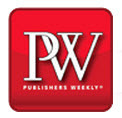 Lest you run afoul of people who want you to think that ebook adoption is somehow bottoming out (you’ll see such articles out and about), note the report from Publishers Weekly’s staff, E-books Drive 3% Quarterly Gain in Adult Trade Sales:
Lest you run afoul of people who want you to think that ebook adoption is somehow bottoming out (you’ll see such articles out and about), note the report from Publishers Weekly’s staff, E-books Drive 3% Quarterly Gain in Adult Trade Sales:
Sales of adult e-books rose 13.6% in the first quarter of 2013 helping to offset sluggish sales of print books in the period, resulting in a 3.3% increase in [US] adult trade sales at companies that report to AAP’s [Association of American Publishers] StatShot program.

Jeremy Greenfield
It sounds like a different story if you read our good colleague Jeremy Greenfield at Digital Book World in eBook Growth Slows to a Crawl in Q1: What Does It Mean?
Greenfield writes:
The first quarter results from the Association of American Publishers confirms it: Ebook revenues in the U.S. won’t be doubling or tripling again any time soon. The boom times are coming to an end.
What frequently confuses people on the ebook-growth story is that “slowdown” and other such terminology can sound as if a fad of some kind has run its course. Indeed, there probably are proponents of print who would like that. Greenfield writes:
The good news is that the threat to the entire physical book ecosystem is now over – or at least put off – and publishers can go back to spending less of their time wondering whether they’ll be out of business in six months. It’s time now to start honing those digital disciplines and building strong publishing businesses.
That sort of writing seems to suggest that e-reading is going to put publishers out of business unless the rate of its popularity growth subsides. Publishers, however, make money from publishing in electronic formats, too, of course. Mulholland Books—an imprint of Little, Brown— publishing the Kindle edition of the book in the States, should be a company full of smiles right now.
What forward-looking publishers see in ebooks is the bottomless warehouse. The end of backlist. The beginnings of networked books that can link you through a jungle of potentially lucrative interconnected thoughts and writings. The twilight of returns. Trucks not wasting gas dragging books all over creation. Trees still standing and making oxygen, a gas for which I’ve developed quite a fondness, myself, next to Ether, of course. You may feel differently.
Kudos to @jasonashlock for candid analysis of @theroguereader‘s hits and misses. Publishing media needs more of that, less airy punditry.
— Guy L. Gonzalez (@glecharles) July 18, 2013
Could you have a better demonstration of the sheer power of e-reading than the ability to instantly fulfill an endless run on a book suddenly gone red hot? No rush to the printer. No
If you’re one of those “love the smell of books” people, frankly, I’m a little weirded out by you, but I’ll respect you in the morning. Just sniff the damned things somewhere else, please. I’m happy for print people to collect and hug their paper. But do not try to dismiss this super little demonstration of just what an utter transformation digital publishing has made in our ability to deliver a book. The digital dynamic—that distributional energy, remember—has just backed right over your print stock.
Beep, beep, beep, baby.
You know you work in publishing when someone mentions the NBA and you immediately think of books.
— Iris Blasi (@IrisBlasi) July 17, 2013
@ChrisKubica Similar room for confusion.
— Iris Blasi (@IrisBlasi) July 17, 2013
OK, an Extra Technical Point: Why Are UK Covers Better?
Behold and then just shut your eyes.
The UK cover is on the left. Nice. Could be in my beloved city of Bath, a handsome sandstone row, creepy lonely figure, the obligatory bats. Sweet.
The US cover on the right? Where’s the Shirtless man to Kiss that Beautiful Woman? Are we not able to make a cover that doesn’t look like romance anymore in this country? I think her ghost lover is about to arrive—shirtless, of course. Hell, she may be witnessing the second coming of Lawrence Welk, are those bubbles?
It’s a crime novel. Who designed this US cover? And how many copies are we trying to sell to readers who are going to think—you know it, I know it—that this is a romance? Hachette, talk to us.
OK, I’ll stop. The Romance Writers of America are sitting in Atlanta in high conclave this week. They probably know where I live. Ethernauts: after three days, look for me.
The sea is not angry today, my friends. It is definitely NOT like an old man, sending back soup in a deli. pic.twitter.com/U93SHxPCNW
— Ginger Clark (@Ginger_Clark) July 16, 2013
The Cultural Point: Warped Speed in the Star System
It’s instructive that the revelation of [Rowling's] authorship has quickly become a story about a well-known writer doing something quirky and eccentric – rather than a telling tale about the state of publishing.

Joan Smith
I couldn’t agree more with Joan Smith at The Guardian. The main story here is being missed entirely. What Eberhardt was talking about without even a glimmer of the fact that we were about to be Rowlinged over by this incident is captured very well in Smith’s opinion piece JK Rowling’s book ruse is a cautionary tale for unknown writers. Note that by “ruse,” Smith’s headline does not refer to the Rowling event as a publicity stunt. She is, instead, simply calling the use of a pseudonym a ruse. (In British English, neither the word ruse nor scheme has the automatically negative connotation attached in American usage.)
propose banning words “controversial” “embattled” and their ilk. they mean nothing absent context and shortcuts make for lazy reporting.
— Emily Williams (@emilyw00) July 18, 2013
Smith writes that by comparison to Rowling’s alter ego Robert Galbraith:
Most first novelists don’t have the option of doing something that will have such a dramatic effect on sales, and they’re already painfully aware that the situation for unknown authors is dire. Publishers have seldom been so reluctant not just to take a risk on new writers, but to back up publication with the resources which go into promoting successful authors.
About to open your mouth to say, “Well it’s always been this way,” right? Read on, emphasis mine on her mention of this as a recent development:
Whether she likes it or not, [Rowling] is in that category of stratospherically famous authors who have become brands; Dan Brown is another obvious example. This is a recent development and its impact on other writers is disastrous, creating a situation in which huge publicity budgets are placed behind a handful of authors, skewing bestseller lists.
“View detours as opportunities, not obstacles.” Plattekill barista/crystalologist
— Paul Bogaards (@paulbogaards) July 18, 2013
I interpret Smith’s comment there to mean that while, yes, we’ve had major writers, of course, gods among us, our pantheons of award winners, the recent development is in our contemporary commercial system’s way of steering resources to blockbusters at the expense of all else.
Smith goes on to recall a similar event in the career of Doris Lessing (now 93), well worth your attention for the comparison factor of an event in the worlds of genre and literary fiction, and in celebrity vs. non-celebrity status.
Smith comes to an all but unavoidable conclusion, lamenting:
The negative impact on thousands of writers the public has never heard of or, more importantly, had the opportunity to read. In that sense, it could even be argued that Rowling’s well-intended hoax has backfired, turning into yet another story about fame in the modern world.
What do you think? Is April Eberhardt right that traditional publishing in general is operating as a kind of star system? And is Joan Smith right that the real story of the Rowling outing is what a celebrity name means in the industry! the industry! today?
Do you love coffee at the café? Your ideal museum is the Mumac, near #Milan. Book now on http://t.co/o1DLm96mA1. pic.twitter.com/659SDxzLsu
— Alitalia (@Alitalia) July 17, 2013
Main image: iStockphoto – Ixpert
The post WRITING ON THE ETHER: Is Publishing’s Star System Cuckoo? appeared first on Jane Friedman and was written by Porter Anderson.
July 15, 2013
Is It Fair Use? 7 Questions to Ask Before Using Copyrighted Material by Brad Frazer
Today’s guest post is by attorney Bradlee Frazer, who has been a guest here several times before. Read his previous posts:
Q&A on Copyright—plus his 101 post on copyright
Guidelines on using trademarks in your work
You might also want to reference my post: When Do You Need to Secure Permissions?
Authors create copyrights when they express their ideas into or onto a tangible medium. This means the author has the right to make copies of the work; the right to create derivative works; the right to distribute copies of the work; the right to publicly perform the work; the right to display the work; and, in the case of sound recordings, the right to perform the work by means of a digital audio transmission.
If you are the sole owner of the copyright to a work, you are the only one who may lawfully do these things or sell/license the rights to someone else to do these things. Conversely, doing one or more of these things without the copyright owner’s permission is called copyright infringement.
One defense against copyright infringement is fair use. Fair use allows you to use someone’s copyrighted work without permission. However, invoking fair use is not a straightforward matter.
The fair use doctrine is defined here. To bring your otherwise unauthorized use within the protection of the doctrine, there are two separate and important considerations. First, your use must be for “purposes such as criticism, comment, news reporting, teaching (including multiple copies for classroom use), scholarship, or research.”
This is the first prong. If your use falls into one of these categories, then you move to the second prong of the test. A court will consider the following four factors to determine if your use is a fair use:
the purpose and character of the use, including whether such use is of a commercial nature or is for nonprofit educational purposes;
the nature of the copyrighted work;
the amount and substantiality of the portion used in relation to the copyrighted work as a whole; and (emphasis added)
the effect of the use upon the potential market for or value of the copyrighted work.
If your use falls into one of the enumerated categories AND you are able to prevail factually on at least two of the four second-prong factors, you might succeed in proving that your use is fair and thus not copyright infringement.
Here’s an example.
Let’s say you are writing a novel for commercial publication and you wish to reproduce the lyrics to the song “Little Red Corvette” by Prince in the book. You are not reproducing the sheet music, and you are not including a sound recording of the song with the book. You are merely causing the literal words of the lyric to appear as prose within your book. Here is the analysis:
Do you own the copyright to the work? No. The author and copyright claimant of these song lyrics are Prince Rogers Nelson (Prince’s real name).
Do you have Prince’s permission? No.
Is your use for “purposes such as criticism, comment, news reporting, teaching (including multiple copies for classroom use), scholarship, or research”? No. You are writing a novel.
Is the purpose and character of the use commercial or noncommercial? Commercial.
What is the nature of the underlying work you are reproducing? Is it highly creative and subject to strong copyright protection, or is it less creative or perhaps even not subject to copyright protection at all? This is a highly creative work that is entitled to strong copyright protection.
Did you use the whole lyric or just a few words? You used the whole lyric.
Will your use of the lyric cause Prince to lose money, e.g., people will not download the song on iTunes anymore? No, your use will likely not cause Prince to lose money.
Of all the fair use factors, you would only perhaps win on one of them, the last one, so if Prince sued you, you would likely not be able to successfully invoke the fair use defense. Other defenses may be available, but probably not fair use.
In each case where you wish to use someone else’s work, and wish to invoke the fair use defense, you should ask those seven questions.
Not all situations call for invocation of the fair use defense. For example, if you only want to use the title of another work, that’s not copyright infringement because titles and short phrases (fewer than ten words or so) are not subject to copyright protection. Similarly, facts are not protected by copyright, and you may use plain, unadorned, uncreative lists of facts without copyright infringement liability. If someone had, for example, prepared an alphabetical list of the fifty states, that list of facts (state names) is not protected under copyright law.
Important note: Attribution is not permission. Merely giving attribution does not mean you may proceed without possible copyright infringement liability. If you cannot obtain permission and cannot definitively conclude your use is a fair use, I recommend that you do not use the third-party content.
Here are some frequent questions that come up in the writing and publishing community.
When writing a commercial work (such as a novel), is it OK to quote another book without seeking permission, as in the case of epigraphs?
A question like “is it OK” is hard for a lawyer to answer because in truth, the only way to know for sure if something is “OK” is by getting sued and then winning that lawsuit. Then, the judge has told you, in essence, “Yes, your behavior is OK.”
A better way to ask the question is: “If I get sued for quoting another book without seeking permission, what defenses may I posit in the lawsuit to increase the chances I will not lose?”
Answering that question is possible, and the answer is that if you copy ten or fewer words from another book you may likely be able to defend yourself under the doctrine that titles and short phrases are not subject to copyright protection. If you use more than 10 or 15 words, then you should ask those 7 questions above to determine how and if you might be able to invoke fair use as a defense if you get sued for copyright infringement. This is why I tell clients to always seek permission, and to remember that attribution alone is not permission.
What if you want to quote a famous person in your book, if they’ve said something publicly?
Remember the definition of copyright. Answering this question turns on whether someone owns a copyright in the spoken words, i.e., have the words been reduced to a tangible medium by someone? The fact that they’ve spoken the words publicly has no bearing on the analysis. Factors to keep in mind:
If the quote is very old, say, more than 100 years old, even if it is in a tangible medium, it is likely that the copyright in that work has expired and that the quote has now entered the public domain.
If you’re using the quote as a means to sell your book, you could get sued for a right of publicity violation, which happens when you commercially exploit someone else’s name or likeness without their permission. (However, it is typically defensible to use someone else’s name or likeness for news, information, and public-interest purposes, but that doesn’t always rule out a violation.) Right of publicity laws vary in each of the fifty states (and publishing something online is like publishing in all states), so you have to be careful.
Does right of publicity only apply in the cases of people who are alive, or does it also apply to people who are dead?
It varies from state to state, but in general, yes, the right of publicity survives the person’s death, in some states for as long as 75 years after they die. Some states may even be longer!
What if I’m quoting or referencing facts from another work?
Plain, unadorned facts are not copyrightable subject matter. For example, if Sue writes down a list of the fifty U.S. states and places that list in her book, I may copy that list exactly from her book and my defense, if she sued me, would be that such a list is an unadorned list of facts and thus are not subject to copyright protection. If, however, Sally, made the list creative and made a photo collage out of it or something, copying the collage might be copyright infringement, but the underlying facts themselves are still not protected by copyright.
It seems like online-based work is often quoted or paraphrased at length, e.g., when the Huffington Post summarizes another online work and links to it. Is that OK?
There are three issues here: quoting, paraphrasing, and linking, but there is nothing fundamentally different about online works that changes the analysis. Some human being wrote the words that appear online, and that human being (or her employer or her assignee) owns a copyright in the work. If someone copies and reproduces most or all of those words somewhere else online (a) without permission; (b) without being able to invoke the Fair Use Defense; (c) without being able to argue that the original words were not copyrightable subject matter; or (d) without invoking some other defense, then that is copyright infringement. Here, the Huffington Post can argue that it is a news outlet, and news outlets get greater latitude to argue the Fair Use Defense. Also, you can summarize another’s works without committing copyright infringement if you do not literally replicate the exact words and all you do is convey the same underlying ideas. Lastly, in most cases you may link to another’s work, as long as you do not literally copy and reproduce all or most of the actual words at the linked story on your site.
Is it ever considered fair use when you want to put a quote from a copyrighted work on a T-shirt?
Short phrases and short quotes are not subject to copyright protection, even if in a tangible medium. If you copy a long phrase, however, say, more than ten or fifteen words, and reproduce it without permission, then yes, you should try to bring your use within the fair use defense in case you get sued. Whether or not it is a fair use will depend on the facts and on how your analysis under fair use doctrine turns out. Remember that on these facts you could also get sued for a right of publicity violation, which happens when you commercially exploit someone else’s name or likeness without their permission. It is completely distinct from a claim of copyright infringement.
What about recipes from cookbooks?
To the extent the recipe is just a list of facts (amounts and ingredients), it is not subject to copyright protection. When a recipe or formula is accompanied by an explanation or directions, the text directions may be copyrightable, but the recipe or formula itself remains uncopyrightable.
What about using direct quotes from TV, film, or advertisements?
Television, film, and advertisements are all copyrightable subject matter, and copying from them without permission is subject to the same analysis.
Please comment or e-mail me at bfrazer@hawleytroxell.com if you have any questions.
The post Is It Fair Use? 7 Questions to Ask Before Using Copyrighted Material appeared first on Jane Friedman and was written by Brad Frazer.
The Fair Use Doctrine: Guidelines From a Copyright Lawyer by Brad Frazer
Today’s guest post is by attorney Bradlee Frazer, who has been a guest here several times before. Read his previous posts:
Q&A on Copyright—plus his 101 post on copyright
Guidelines on using trademarks in your work
You might also want to reference my post: When Do You Need to Secure Permissions?
Authors create copyrights when they express their ideas into or onto a tangible medium. This means the author has the right to make copies of the work; the right to create derivative works; the right to distribute copies of the work; the right to publicly perform the work; the right to display the work; and, in the case of sound recordings, the right to perform the work by means of a digital audio transmission.
If you are the sole owner of the copyright to a work, you are the only one who may lawfully do these things or sell/license the rights to someone else to do these things. Conversely, doing one or more of these things without the copyright owner’s permission is called copyright infringement.
One defense against copyright infringement is fair use. Fair use allows you to use someone’s copyrighted work without permission. However, invoking fair use is not a straightforward matter.
The fair use doctrine is defined here. To bring your otherwise unauthorized use within the protection of the doctrine, there are two separate and important considerations. First, your use must be for “purposes such as criticism, comment, news reporting, teaching (including multiple copies for classroom use), scholarship, or research.”
This is the first prong. If your use falls into one of these categories, then you move to the second prong of the test. A court will consider the following four factors to determine if your use is a fair use:
the purpose and character of the use, including whether such use is of a commercial nature or is for nonprofit educational purposes;
the nature of the copyrighted work;
the amount and substantiality of the portion used in relation to the copyrighted work as a whole; and (emphasis added)
the effect of the use upon the potential market for or value of the copyrighted work.
If your use falls into one of the enumerated categories AND you are able to prevail factually on at least two of the four second-prong factors, you might succeed in proving that your use is fair and thus not copyright infringement.
Here’s an example.
Let’s say you are writing a novel for commercial publication and you wish to reproduce the lyrics to the song “Little Red Corvette” by Prince in the book. You are not reproducing the sheet music, and you are not including a sound recording of the song with the book. You are merely causing the literal words of the lyric to appear as prose within your book. Here is the analysis:
Do you own the copyright to the work? No. The author and copyright claimant of these song lyrics are Prince Rogers Nelson (Prince’s real name).
Do you have Prince’s permission? No.
Is your use for “purposes such as criticism, comment, news reporting, teaching (including multiple copies for classroom use), scholarship, or research”? No. You are writing a novel.
Is the purpose and character of the use commercial or noncommercial? Commercial.
What is the nature of the underlying work you are reproducing? Is it highly creative and subject to strong copyright protection, or is it less creative or perhaps even not subject to copyright protection at all? This is a highly creative work that is entitled to strong copyright protection.
Did you use the whole lyric or just a few words? You used the whole lyric.
Will your use of the lyric cause Prince to lose money, e.g., people will not download the song on iTunes anymore? No, your use will likely not cause Prince to lose money.
Of all the fair use factors, you would only perhaps win on one of them, the last one, so if Prince sued you, you would likely not be able to successfully invoke the fair use defense. Other defenses may be available, but probably not fair use.
In each case where you wish to use someone else’s work, and wish to invoke the fair use defense, you should ask those seven questions.
Not all situations call for invocation of the fair use defense. For example, if you only want to use the title of another work, that’s not copyright infringement because titles and short phrases (fewer than ten words or so) are not subject to copyright protection. Similarly, facts are not protected by copyright, and you may use plain, unadorned, uncreative lists of facts without copyright infringement liability. If someone had, for example, prepared an alphabetical list of the fifty states, that list of facts (state names) is not protected under copyright law.
Important note: Attribution is not permission. Merely giving attribution does not mean you may proceed without possible copyright infringement liability. If you cannot obtain permission and cannot definitively conclude your use is a fair use, I recommend that you do not use the third-party content.
Here are some frequent questions that come up in the writing and publishing community.
When writing a commercial work (such as a novel), is it OK to quote another book without seeking permission, as in the case of epigraphs?
A question like “is it OK” is hard for a lawyer to answer because in truth, the only way to know for sure if something is “OK” is by getting sued and then winning that lawsuit. Then, the judge has told you, in essence, “Yes, your behavior is OK.”
A better way to ask the question is: “If I get sued for quoting another book without seeking permission, what defenses may I posit in the lawsuit to increase the chances I will not lose?”
Answering that question is possible, and the answer is that if you copy ten or fewer words from another book you may likely be able to defend yourself under the doctrine that titles and short phrases are not subject to copyright protection. If you use more than 10 or 15 words, then you should ask those 7 questions above to determine how and if you might be able to invoke fair use as a defense if you get sued for copyright infringement. This is why I tell clients to always seek permission, and to remember that attribution alone is not permission.
What if you want to quote a famous person in your book, if they’ve said something publicly?
Remember the definition of copyright. Answering this question turns on whether someone owns a copyright in the spoken words, i.e., have the words been reduced to a tangible medium by someone? The fact that they’ve spoken the words publicly has no bearing on the analysis. Factors to keep in mind:
If the quote is very old, say, more than 100 years old, even if it is in a tangible medium, it is likely that the copyright in that work has expired and that the quote has now entered the public domain.
If you’re using the quote as a means to sell your book, you could get sued for a right of publicity violation, which happens when you commercially exploit someone else’s name or likeness without their permission. (However, it is typically defensible to use someone else’s name or likeness for news, information, and public-interest purposes, but that doesn’t always rule out a violation.) Right of publicity laws vary in each of the fifty states (and publishing something online is like publishing in all states), so you have to be careful.
Does right of publicity only apply in the cases of people who are alive, or does it also apply to people who are dead?
It varies from state to state, but in general, yes, the right of publicity survives the person’s death, in some states for as long as 75 years after they die. Some states may even be longer!
What if I’m quoting or referencing facts from another work?
Plain, unadorned facts are not copyrightable subject matter. For example, if Sue writes down a list of the fifty U.S. states and places that list in her book, I may copy that list exactly from her book and my defense, if she sued me, would be that such a list is an unadorned list of facts and thus are not subject to copyright protection. If, however, Sally, made the list creative and made a photo collage out of it or something, copying the collage might be copyright infringement, but the underlying facts themselves are still not protected by copyright.
It seems like online-based work is often quoted or paraphrased at length, e.g., when the Huffington Post summarizes another online work and links to it. Is that OK?
There are three issues here: quoting, paraphrasing, and linking, but there is nothing fundamentally different about online works that changes the analysis. Some human being wrote the words that appear online, and that human being (or her employer or her assignee) owns a copyright in the work. If someone copies and reproduces most or all of those words somewhere else online (a) without permission; (b) without being able to invoke the Fair Use Defense; (c) without being able to argue that the original words were not copyrightable subject matter; or (d) without invoking some other defense, then that is copyright infringement. Here, the Huffington Post can argue that it is a news outlet, and news outlets get greater latitude to argue the Fair Use Defense. Also, you can summarize another’s works without committing copyright infringement if you do not literally replicate the exact words and all you do is convey the same underlying ideas. Lastly, in most cases you may link to another’s work, as long as you do not literally copy and reproduce all or most of the actual words at the linked story on your site.
Is it ever considered fair use when you want to put a quote from a copyrighted work on a T-shirt?
Short phrases and short quotes are not subject to copyright protection, even if in a tangible medium. If you copy a long phrase, however, say, more than ten or fifteen words, and reproduce it without permission, then yes, you should try to bring your use within the fair use defense in case you get sued. Whether or not it is a fair use will depend on the facts and on how your analysis under fair use doctrine turns out. Remember that on these facts you could also get sued for a right of publicity violation, which happens when you commercially exploit someone else’s name or likeness without their permission. It is completely distinct from a claim of copyright infringement.
What about recipes from cookbooks?
To the extent the recipe is just a list of facts (amounts and ingredients), it is not subject to copyright protection. When a recipe or formula is accompanied by an explanation or directions, the text directions may be copyrightable, but the recipe or formula itself remains uncopyrightable.
What about using direct quotes from TV, film, or advertisements?
Television, film, and advertisements are all copyrightable subject matter, and copying from them without permission is subject to the same analysis.
Please comment or e-mail me at bfrazer@hawleytroxell.com if you have any questions.
The post The Fair Use Doctrine: Guidelines From a Copyright Lawyer appeared first on Jane Friedman and was written by Brad Frazer.
July 11, 2013
WRITING ON THE ETHER: Time for Literary Fiction To Come Out of the Cloisters? by Porter Anderson
Table of Contents
Our Deepening Disruption
Anastas Has Left the Building
East of Eden
Our Deepening Disruption
If I could make today’s Ether “come on little cat feet,” as Fog poetically does, I’d like that.
No, put away those cat pictures, and don’t stick the voodoo of your Pinterest collection into Carl Sandburg, he can’t defend himself.
See, I’m trying to sneak up on a speculative issue. The trick is to avoid tripping the genre-paranoia and business-is-business wires. They tend to set off all kinds of mind-closing alarms whenever someone says “literary.”
To weigh the growing burden that I think is now heavy on the literary-fiction community, we need to get around a couple of barriers.
(1) Genre-paranoia is my phrase for the unhappy belief suffered by many genre writers that they are automatically disparaged by literary-fiction people and seen by most creatures of the realm as lesser lugs, serfs in the fields of mindless consumer consumption. If you are a genre writer and have ever felt so cheapened, please note that I am not saying such bad things about you here. Any such paranoia you’re feeling right now has come in on your own little cat feet, I’m not big-footing your genre.
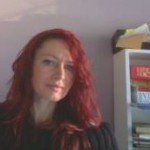
Roz Morris
In fact, have a look at Why Literary Novels Take So Long To Write by Ether sponsor Roz Morris. Without writing “formulaic”—nor even the word formula—she was accosted in comments by readers who wrote that she had said genre work is formulaic. What she was saying is that literary work, by contrast to much genre work, doesn’t offer the parameters of specific subject matter. Literary starts with no set answer to audience expectation. And thus it can take a literary writer longer to develop a theme because “there are no rules,” as the phrase goes.
Morris:
If I wrote genre fiction, it would be clear how to develop an idea. I’d line up the tropes, check I’d ticked all the boxes, add a twist of me and voila. Instead, I have to invent the novel’s framework, context and references. Tropes and conventions might suggest possibilities, but I’m out on my own – and not even sure what I’m looking for.
 This is no more difficult a point, surely, than one of the key observations we get from another Ether sponsor, Joanna Penn, in her new How To Market a Book. (She has just followed up, by the way, with 3 Critical Marketing Principles For Authors From The Bookseller Marketing and Publicity Conference held earlier this week in London.)
This is no more difficult a point, surely, than one of the key observations we get from another Ether sponsor, Joanna Penn, in her new How To Market a Book. (She has just followed up, by the way, with 3 Critical Marketing Principles For Authors From The Bookseller Marketing and Publicity Conference held earlier this week in London.)
I was quoting her post here at Ether host JaneFriedman.com, How to Sell More Books By Optimizing Your Metadata on Tuesday at Publishing Perspectives in Ether for Authors: Is Today’s Book Marketing All in the Algorithms?
Penn wrote:
You might not want to put [your book] in a box or a genre or a category, but you have to, because that’s how readers find it. The category/genre reader has expectations, and if you don’t “fit,” they will be disappointed.
UPDATE: See Penn’s comment below in which she points out something potentially very helpful. As long as everything must be categorized for the online marketplace, why shouldn’t we finally ditch the “genre” terminology entirely and simply talk of “categories?” Literary fiction is, in that context, a category. The playing field goes level. What do you think?

Julie Crisp
Meanwhile, Julie Crisp, Tor UK’s Editorial Director, reveals in Sexism in Genre Publishing: A Publisher’s Perspective, that there can be a lot of bad assumptions made within the genre world about itself, too, of course. (In what industry is that not the case?)
Crisp and her staff wanted to respond to complaints that there aren’t enough women in science-fiction. As chief of an open-submission house, and going over what had come in since the end of January, Crisp writes:
The facts are, out of 503 submissions – only 32% have been from female writers [for all Tor UK genres]…When it comes to science fiction only 22% of the submissions we received were from female writers. That’s a relatively small number when you look at how many women are writing in the other areas, especially YA. I’ve often wondered if there are fewer women writing in areas such as science fiction because they have turned their attentions to other sub-genres but even still, the number of men submitting to us in total outweighs the women by more than 2:1.
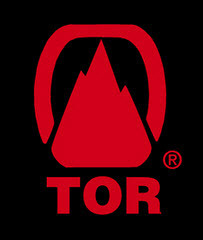 The helpful chart Crisp includes shows that, true to many expectations, women’s submissions far outnumber men’s in YA (68% to 32%). And women handily lead men in urban fantasy and paranormal romance. (57% to 43%). But it’s really hard to argue with the numbers on sci-fi as well as on a category Tor calls “historical/epic/high-fantasy” (women 33%, men 67%), horror (women 17%, men 83%), and a particularly delightful designation, “Other (difficult to categorize)” — it seems the guys are playing harder to categorize than the women by a substantial 73% to 27%.
The helpful chart Crisp includes shows that, true to many expectations, women’s submissions far outnumber men’s in YA (68% to 32%). And women handily lead men in urban fantasy and paranormal romance. (57% to 43%). But it’s really hard to argue with the numbers on sci-fi as well as on a category Tor calls “historical/epic/high-fantasy” (women 33%, men 67%), horror (women 17%, men 83%), and a particularly delightful designation, “Other (difficult to categorize)” — it seems the guys are playing harder to categorize than the women by a substantial 73% to 27%.
Nevertheless, the general defensiveness around the topic of genre work goes on. Just to grab a couple more lines from Morris’ responses, here is fantasy and sci-fi writer Michael S. Manz in a comment:
If you wrote genre fiction you might have a better idea of what’s involved in writing genre fiction. Although, come to think of it, you do write genre fiction. ‘Literary fiction’ is just another genre – the pretentious genre, as you’ve proven here.
Get that tone? Not even collegial. Adversarial. Genre-paranoia at work. That allegation of pretension always seems to come up, doesn’t it?
And Morris, going down for the 18th time or so, answers:
Yes, I write both sides of the literary/genre fence, which is what enables me to make the comparison. I feel you have misunderstood me because I was comparing the relative difficulty, not saying genre was worthless.
Apple loss to DOJ is a black mark for a company that really doesn’t need another one. http://t.co/U4GvifWcjs
— Tom Dupree (@TomDupree1) July 11, 2013
(2) The business-is-business trip wire is a conversation stopper. It’s that’s dismissive phrase hurled at you as soon as you suggest that literature of any kind—high or low, literary or genre, illuminated manuscripts or the backs of cereal boxes—is anything more than a business. 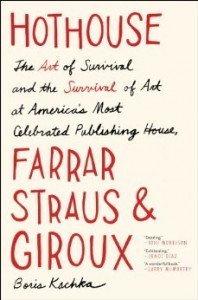 Literature is more than a business. It’s not all “just content.” it has to do, however tangentially or unflatteringly in some instances, with the cultural character of a nation and of the world. You don’t have to be writing to the Corinthians every time you sit down at the keyboard. But shutting down any discussion of what’s going on in the industry! the industry! with the business-is-business shrug shows the rest of us only a coarse opportunism that doesn’t really belong in creative expression. In his New York Times op-ed piece, Book Publishing’s Big
Literature is more than a business. It’s not all “just content.” it has to do, however tangentially or unflatteringly in some instances, with the cultural character of a nation and of the world. You don’t have to be writing to the Corinthians every time you sit down at the keyboard. But shutting down any discussion of what’s going on in the industry! the industry! with the business-is-business shrug shows the rest of us only a coarse opportunism that doesn’t really belong in creative expression. In his New York Times op-ed piece, Book Publishing’s Big

Boris Kachka
Gamble, Boris Kachka (author of Hothouse, about Farrar, Straus & Giroux, coming in August) is looking at the Penguin Random House merger with a careful eye that allows for no whine of business-is-business. He points out (I’ll give him a little length here, stay with me):
Dozens of formerly independent firms have been folded into this conglomerate: not just Anchor, Doubleday, Dutton, Knopf, Pantheon, G. P. Putnam’s Sons and Viking, which still wield significant resources, but also storied names like Jonathan Cape, Fawcett, Grosset & Dunlap, and Jeremy P. Tarcher. Many of these have been reduced to mere imprints, brands stamped on a book’s title page, though every good imprint bears the faint mark of a bygone firm with its own mission and sensibility…Among the imprints that survive, the tendency is to homogenize and focus on a few general fields like ambitious nonfiction, accessible literary fiction or thrillers.
Nobody gets out of Kachka’s piece with a business-is-business smirk, thankfully.

Dave Morris
And, look, here’s another Morris heard from, author Dave Morris, whose app-interpretation of Mary Shelley’s Frankenstein—Etherized here 65 weekly columns ago, or just after Shelley’s death in 1851—is, believe it or not, actually expected finally to show up for Android this week via Google Play. Morris followed Tuesday’s Ether with a reaction in comments to some of Penn’s guidance on categorization of work for good metadata with an interesting concern for how confining these algorithmic needs may be when it comes to book discoverability. Again, we’ll take a little depth here to get Morris’ point that our new digital realities—to which Penn is rightly responding—make it harder to escape genre-fication, even when that’s not the intention. Morris:
This question of the need to declare a genre… It troubles me. I love Dorothy L Sayers, but have no interest in crime novels. I’m an avid reader of Mark Waid’s Irredeemable, but otherwise never so much as glance at superhero comics. My enjoyment of Jonathan Strange & Mr Norrell almost certainly won’t induce me to pick up any other fantasy novels this decade. When someone asks me what kind of books I like, I could talk for hours and never mention genre. So, are my reading tastes so peculiar? When I go into a bookshop, I browse around the shelves marked only “Fiction” – but I notice that’s by far the largest section, so we non-genre (or at any rate genre-agnostic) readers must be in the majority. Or rather, we were. While there were still bookstores on most high streets, non-genre fiction could thrive. When the bookstores are gone, and book sales are largely online, that’s an environment that will favour the clear and distinct labels of genre.
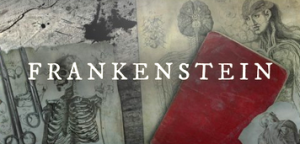 This is a serious point. Amazon, of course, includes a Literary designation in its intricate categorization scheme and nothing there indicates that non-genre readers and writers aren’t fully welcome. Nevertheless, what Morris is getting at is that when, as I wrote Tuesday, your first and potentially most influential reader is a machine—the job of which is to parse and niche your book properly for sale—the ability for both creator and consumer to stay floaty, to get off into that marvelous in-house Tor designation of “Other (difficult to categorize)” and look around? It gets harder. Morris again:
This is a serious point. Amazon, of course, includes a Literary designation in its intricate categorization scheme and nothing there indicates that non-genre readers and writers aren’t fully welcome. Nevertheless, what Morris is getting at is that when, as I wrote Tuesday, your first and potentially most influential reader is a machine—the job of which is to parse and niche your book properly for sale—the ability for both creator and consumer to stay floaty, to get off into that marvelous in-house Tor designation of “Other (difficult to categorize)” and look around? It gets harder. Morris again:
From the point of view of successful marketing, it seems genre will be as essential as team colours in a football game. And genres will become ever more specific – no longer just “SF” but now “pre-Victorian colonial steampunk” and so on. For those of us whose preference is to pick up a book without much idea where it’s going to take us, is there hope?
Good question. Read on.
Anastas Has Left the Building

Jane Friedman
I hope you’ve been following the conversation triggered by our colleague Jane Friedman here at her site yesterday with her post Does Twitter Make Sense for Most Writers? She’s taking on the tour-de-social-media mounted by literary writer and memoirist Benjamin Anastas, of last fall’s Too Good To Be True. God forbid I give you his Twitter handle. He has withdrawn, declared himself a most determined Twitter refusenik, after “1 year, 4 months and 22 days.” He posts twice about it: First in Goodbye to Twitter Village, and then in a follow-up, Goodbye to Twitter Village, Part II: Lessons Learned. Several of us have noted with Friedman in the discussion of the last couple of days that blogging, itself, is largely part of social media (still a plural word, damn it).

Benjamin Anastas
There’s some gentle irony, perhaps, in his extensive divestiture in that form. Friedman does us the service of sorting out an efficient list of his points, she writes, “that I find striking and true—each encapsulating things I’ve told authors myself, again and again.” Her list: (1) “It’s all ephemera, meant for instant consumption and destined for replacement by the avalanche of tweets to follow.” (2) “If I wanted to gain an audience on Twitter—and keep as many of them as possible from un-following me—I had to offer something beyond a promotional platform for my book.” (3) “I came to Twitter because I had a book to sell, and my misgivings about the whole enterprise meant that I would never be any good at it.” (4) “I’ve come to doubt Twitter’s value as a marketing platform.” (5) “My friend A. was right when he said that you had to enjoy Twitter for it make any sense.” (6) “Tweets won’t gain you followers. Publishing in the real world will.” I commend that list to you, and would like to add just one point of my own that will surprise no regular Ethernauts who know of my disgust for cutesy corporate names. 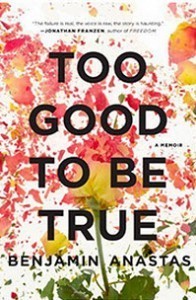 In his first of the two pieces, Anastas gets at the Twitter name. Thusly:
In his first of the two pieces, Anastas gets at the Twitter name. Thusly:
The name…Twitter—was an obstacle for me from the start, in part because it was so patently stupid, but also because I recognized that it was stupid in just the right way and would probably make the people who coined it billionaires.
For that sentence, alone, all is pretty much forgiven, Anastas, as far as I’m concerned. Twitter is, exactly, a patently stupid name. We need not get too stuck on this point, but I sometimes wonder what we might think of this powerful platform Twitter had it been given a serious, respectable name instead of what sounds like the title of a small, amateur ornithological society newsletter.

Mathew Ingram
I worry about this especially when I watch our GigaOm colleague Mathew Ingram toiling away to explain, yet again, that Twitter is, in fact, locked in a huge struggle to find its footing as a new-era news medium, beset at every turn by users who come to it with all the sense and responsibility we might expect from twits. If you don’t see Ingram’s work regularly, here’s a good recent example of what I’m talking about. In Research shows Twitter could be a tool for aid workers during events like the Boston bombings, he writes:
Twitter came under fire for its lack of credibility as a real-time news source during the bombings in Boston earlier this year, thanks to a variety of hoaxes and erroneous reports that were spread about those who were allegedly responsible for the attacks. But despite these obvious flaws, researchers with the Harvard Medical School who looked at information flow on Twitter during the bombings argue that the network could be a valuable tool for emergency workers and others during such disasters.
HE WAS GAY. RT @sarahw Another “groundbreaking” JFK book due out this fall. Details embargoed, of course. http://t.co/KI9eMjCBis
— Paul Bogaards (@paulbogaards) July 11, 2013
But putting aside the Twitter name so we can have an adult conversation about it, it’s not hard to understand the qualms of the exiting Anastas. You can see this in many of the comments Friedman’s post has attracted. The addictive, time-eating, party-paced clamor of Twitter is simply not right or useful for many authors, nor for lots of others whose lives and work fare better in more focused, long-stint rhythms of application and output. And yet, just as Friedman writes in her appraisal, I’m pretty torn on this question, too. What she’s talking about is centered in Anastas’ lines:
Mystery plays a big role in our love of books, and by using social media to promote yourself, you’re only demystifying your work for everyone who follows you. And that makes you lose potential readers.
And you know, he’s right. And so I’m signing off of all social media now for good, take care. I’m teasing.
Friedman responds to the mystique issue:
It’s a perspective I find most common among the more literary authors—a desire to preserve the mystique of their work, who they are, and what they do…On the one hand, the whole author mystique game is very peculiar to the literary community. It’s hard to find commercial or genre authors acting like a Thomas Pynchon; you won’t find them saying things like “I don’t really write for readers. I think that’s the defining characteristic of being serious as a writer.” On the other hand, I think it’s possible to use social media and keep the mystique in play. That’s part of the artistry. Use the tools to your own ends, rather than letting the tools use you (which I believe happened to Anastas—and it happens to all of us, at one time or another).
East of Eden
We do have examples, a few, of literary authors who have used social media, even Twitter, as Friedman says, to keep the mystique in play.

Margaret Atwood
Margaret Atwood, of course, is the champion on this, going so far as to co-write material (about zombies) for Wattpad and, yes, the great lady tweets. But, then, Atwood had several decades, many books, and major literary cred before venturing forth among our bluebirds of yappiness on the tweet machine. I take nothing from Atwood, don’t misunderstand. 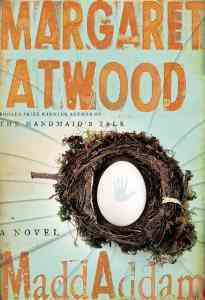 But that’s just it. At this stage in her career, almost no one can take anything from her and the sheer charm value of getting a tweet from her kitchen in Toronto is, just as Friedman suggests, the social-media art set dancing. Anastas, in his forties and with several books to his credit, is no spring chicken, of course. But is he, like HRM Elizabeth II, ready to arrive at the Olympics in an apparent Bond-stunt from a copter? Or is that dive still too steep for someone for whom literature is not initially about commerce or entertainment but about art? A side of me says Anastas is right…and he’s right… and he’s right…and I don’t know if we can afford that particular rightness anymore.
But that’s just it. At this stage in her career, almost no one can take anything from her and the sheer charm value of getting a tweet from her kitchen in Toronto is, just as Friedman suggests, the social-media art set dancing. Anastas, in his forties and with several books to his credit, is no spring chicken, of course. But is he, like HRM Elizabeth II, ready to arrive at the Olympics in an apparent Bond-stunt from a copter? Or is that dive still too steep for someone for whom literature is not initially about commerce or entertainment but about art? A side of me says Anastas is right…and he’s right… and he’s right…and I don’t know if we can afford that particular rightness anymore.
“When the dust settles” at Readers Digest http://t.co/VWz4hExOXI — Brian O’Leary (@brianoleary) July 10, 2013
@DonLinn damn.. THAT was the title. I should have pushed myself a bit harder. Aces. — Brian O’Leary (@brianoleary) July 10, 2013
As you can tell from my label-issuing impatience with the genre-paranoids among us and with the business-is-business shrug-offs at the next table, I don’t like what I see as a gradual diminution of the place and purpose of literary fiction in our culture.
I’ve written before about how the digital dynamic is a distributional energy that favors genre and entertainment. Like a fire seeking oxygen, the digital disruption seeks the biggest audiences. And those biggest audiences prefer, for the most part, entertainment over art and genre work over literary. (No value judgment here, this is simply life in our era, populist diversions available on a scale unmatched in human history.)
But at the same time, I now have to question in all honesty whether the sort of mystique that Anastas is writing about—something I’ve actually enjoyed, respected, even admired in some writers and other artists—is going to be, what? Affordable? Viable? Even desirable in a world that loves nothing more than to call literary writing “pretentious?”
Does BEA plan on giving me a prize when I successfully complete my fourth unsubscribe from their feedback emails? — Matt Mullin (@mrmullin) July 10, 2013
I’m in lockstep with Morris—with Morris & Morris, actually—whether trying to sort out the slow-food nature of literary work or worrying about having to over-categorize every freaking syllable. Because, Penn is right, the algorithms are upon us, and those machines need keywords to sell anything. But when I first encountered Friedman’s flagging of the Anastas material, I wrote back on Tumblr to her:
Each time an author tweets me, I wonder about this. At exactly the moment I appreciate the access they’re giving me to them, in some subtle way I also regret it. Both for me and for them. In the same way that our celebrity culture has finally succeeded in “pulling down” the famous to such a ground-level state that the public seems to expect to have access to them, that special distance Anastas talks about is closing between writers and “their” authors.
If we say to writers that the advantage and mandate of the digital dynamic is the interaction with and development of one’s audience, it gets harder every day to support artful aloofness
#Apprentice interviews reveal how self confidence is no substitute for being normal — Jonny Geller (@JonnyGeller) July 10, 2013
No, not because I need our best literary writers to bunk on Olympus and giggle fabulously from on-high at our tweet-smeared fistfights for respect at ground level.
However, like conflict of interest, even the appearance of pretension—and that’s what the “mystique” can surely conjure in minds looking for it—may at last prove too costly in a world that’s now mad for the ether and determined to have access to everyone on it.
So I’m going to head in this direction and I’d like your input on it: I need to see people read, support, and promote literary fiction more than I need to see the trappings of mystique, distance, and deference preserved for its writers.
Honestly, I still think good things come out of cloisters, not bad things. Because the lucky refugees inside from the hurly-burly outside have a chance to think straight. A lot of the best literary work has come from soul not situation, calm not comedy, examination not exhibitionism.
Len first, Len last.
— Sarah Weinman (@sarahw) July 8, 2013
But maybe the digital drive has made it so far into literature’s lair now that we have to start asking our best literary writers if they could give this thing some thought. Anastas is out the door, fine, but there are lots more where he came from. And I think we need them.
We need literary fiction. We don’t need it sidelined by every genre-paranoic who wants to shout “elitism!” at them from across the street.
Maybe it’s time the literati joined us.
What do you think? Should literary writers try doing a bit more to meet this modern marketplace halfway? Or should they, as Anastas says he’s doing, “go back to being a writer again”?
Bought myself a Henry Miller letter. http://t.co/HAazI7gfpM
— Shaun Usher (@LettersOfNote) July 3, 2013
Main image: imelenchon
The post WRITING ON THE ETHER: Time for Literary Fiction To Come Out of the Cloisters? appeared first on Jane Friedman and was written by Porter Anderson.
July 9, 2013
Does Twitter Make Sense for Most Writers? by Jane Friedman
Yesterday I read “Goodbye to Twitter Village, Part II: Lessons Learned” by author Benjamin Anastas. It’s a lengthy post about why, after more than a year on Twitter, Anastas has decided it’s a waste of time.
It’s hard to disagree with much of what he says. (Perhaps this comes as a surprise to those who see me as a big advocate of writers having an online presence, building platform, etc.)
Here are some of his points that I find striking and true—each encapsulating things I’ve told authors myself, again and again:
“It’s all ephemera, meant for instant consumption and destined for replacement by the avalanche of tweets to follow.”
“If I wanted to gain an audience on Twitter—and keep as many of them as possible from un-following me—I had to offer something beyond a promotional platform for my book.”
“I came to Twitter because I had a book to sell, and my misgivings about the whole enterprise meant that I would never be any good at it.”
“I’ve come to doubt Twitter’s value as a marketing platform.”
“My friend A. was right when he said that you had to enjoy Twitter for it make any sense.”
“Tweets won’t gain you followers. Publishing in the real world will.”
It’s how Anastas ends his article that’s sparked me to post about it:
Mystery plays a big role in our love of books, and by using social media to promote yourself, you’re only demystifying your work for everyone who follows you. And that makes you lose potential readers.
It’s a perspective I find most common among the more literary authors—a desire to preserve the mystique of their work, who they are, and what they do.
I’m pretty torn on this.
On the one hand, the whole author mystique game is very peculiar to the literary community. It’s hard to find commercial or genre authors acting like a Thomas Pynchon; you won’t find them saying things like “I don’t really write for readers. I think that’s the defining characteristic of being serious as a writer.”
On the other hand, I think it’s possible to use social media and keep the mystique in play. That’s part of the artistry. Use the tools to your own ends, rather than letting the tools use you (which I believe happened to Anastas—and it happens to all of us, at one time or another).
The paradox for me: Anastas appears to have no problem with blogging. (I think—maybe that complaint is in a different post.) I didn’t follow Anastas on Twitter, but if I did, I wonder if I would know as much about him as I do now, from reading this single blog post. Blogging is as much social media as tweeting, Facebooking, and all the rest of it. Anastas has a comments section where he invites people to “fire away.” And now here I am, engaging in a dialogue in my preferred venue, because I’d like to bring his provocative perspective to a wider audience, if I can—I’d like to stir a discussion and see what you think. Because I’m still deciding.
One favor to ask: Pair Anastas’s piece with the following RSA Animate video. It’s about 10 minutes of your time, but watch it and see how the two perspectives compare. Are they compatible? And if they’re not, will writers in the future be able to take the same path Anastas has: ”I’ll go back to being a writer again. Just a writer. Not a writer who’s wasting his time on social media.”
The post Does Twitter Make Sense for Most Writers? appeared first on Jane Friedman and was written by Jane Friedman.
July 8, 2013
How to Sell More Books By Optimizing Your Metadata by Joanna Penn
T oday’s guest post is excerpted from How to Market a Book by Joanna Penn (@thecreativepenn). I’m grateful to Joanna for sharing her expertise here; if you’re not familiar with her blog, I encourage you to visit and subscribe—click here to visit The Creative Penn.
You can never sell as many books as Amazon, Kobo, Barnes & Noble, Apple, and the other retailers can sell for you.
Why? Because they have a vast sea of readers who specifically go to their sites to buy books. Every day, readers are spending millions of dollars looking for, and buying, their next read in those stores.
Sure, you can build a massive following on your website or through your speaking platform, but it will never equal the volume of readers that these book distributors have access to every day. The trick is ensuring your book can be seen by those avid book readers.
Nobody can say for sure how the book retailer recommendations work, but what can be known is this: Data algorithm engines within every book retail site drive what is seen on the homepage of every customer, as well as what is sent in personalized e-mails.
The very best book to read on the algorithms and how you can understand them is: Let’s Get Visible by David Gaughran. It’s well worth a few dollars to understand the algorithms—and Amazon lists in particular—in depth.
So your job is to ensure that your book is found by the algorithms, and then you will find that your sales are perpetuated. Success does indeed breed success. But how can you optimize your chances?
1. Choose the right category.
Remember: not everyone will like your book.
You may think that everyone will, but they won’t. You might not want to put it in a box or a genre or a category, but you have to, because that’s how readers find it. The category/genre reader has expectations, and if you don’t “fit,” they will be disappointed.
That’s not to say that you need to follow any specific rules in your writing, but when you load it up to the distributors, you have to choose which categories to use, and they need to be meaningful.
If you have a publisher, they will do this for you, but it’s best to discuss it with them.
It’s important to match reader expectations and the promise of what your book delivers with what your book is actually about. There is no point having a book with a swirly, girly pink chic-lit cover in the horror section of fiction. It won’t sell, however good it is.
If you can, choose a category that fits your book and is easier to rank in. How do you know which categories are easier to rank in? Check the number in brackets in the category on Amazon. The lower the number, the easier it probably will be. That’s optimization—but the category must still be true to the book and to the reader’s expectations. You only get to select a couple of categories, so make them count.
If you’re struggling with this, choose 3-5 authors whose books are similar to yours (not what you want your book to be like, but what it is really like), and check what categories they are in. That will help you to find the appropriate category.
2. Use the best keywords.
Keywords and search engine optimization have been considered important for a long time in the online world, particularly for ranking on the first few pages of search engines so that people can actually find you.
But these principles and tools are also important for your book page on the retail stores. They make up a critical part of the metadata that’s crucial in the discoverability of your book.
What is a keyword?
A keyword is a word or phrase that is associated with your book.
It’s based on the words that people actually use to search online. Often the language you use online is not the language that your customers might use. For example, some authors like the term “indie author” or “indie publishing,” but to a new author, they might only recognize “publishing” or “self-publishing.”
Importantly, a keyword is not just one word. Remember that as you go through the following process. For example, my thriller novel Exodus is associated with the keyword “ark of the covenant” and my nonfiction book with “career change.”
Brainstorm words and phrases. Make a list of all the words and phrases that are associated with your book. For fiction, that will include themes, places, things and anything concrete that you can hang your book off. For Exodus, I might consider the keywords thriller, action adventure, exodus, ark of the covenant, israel, freemasons—as those are the themes of the book and people searching for those things will be interested in it.
Check the usage of keywords in the search engines. Google has a Keyword Search Tool that you can use to discover what search terms people are using and what are the most popular. It is primarily used for people working on advertising terms, but we can use it as an indication of interest, as well as a verification of the kind of language that people use when searching. You will likely be surprised at what you find.
Try to be as specific as possible. For example, the word “pain” could relate to back pain, pain of grief, pain of divorce, and many more options, so use keyword phrases where possible.
Note the number of global monthly searches per keyword/phrase. With my book Career Change , when I checked the volume of searches, I found the following: how to enjoy your job – 5,400 global monthly searches; changing careers – 27,100 global monthly searches; I need a career – 60,500 global monthly searches; choosing a career – 40,500 global monthly searches; career change – 165,000 global monthly searches.
For each search term, Google will recommend more options. Look through that list and write down anything else with a high number of searches. (Don’t worry about the competition column as that is aimed at the advertising crowd.)
Nonfiction authors should be using this type of research to make a decision on the title or—at least—subtitles. There’s no point in your title meaning something to you but nothing to anyone else. Too often, authors will decide on a title that has emotional resonance for them when they would be better off using specific keywords to help customers find them more easily.
3. Check the usage of keywords on Amazon.
Amazon doesn’t have a specific tool to check keywords, but it does have an auto-populate tool that enables you to see a drop-down of specific words or phrases. Just start typing something in and you’ll get a drop-down. Make sure that you’re in the Books/Kindle store if you want to narrow the search down.
This can help you decide on topics or titles, particularly again with nonfiction. The principle is the same with fiction. You want the most commonly used keywords in your metadata.
Some of your keywords from Google might not even show up in the Amazon listing, so discard those and focus on keywords that appear in both lists.
4. Add the keywords to your book metadata.
For nonfiction authors, you can use this technique to decide on your book title, and indeed, I changed my nonfiction book title, Career Change, based on the keyword search. (It used to be How to Enjoy Your Job or Get a New One.) This can make a huge difference to your book appearing in search results and significantly impact your success. Although I don’t have a full year for each different title usage, in January 2012 I sold 9 books, and in January 2013 I sold 135 books. The cover and keywords were different. This is not something I market in any other way at all, so any sale is a good sale. I have no platform for the career-change niche, so all of my marketing is about keyword search. My book sales rank rose within days after the keyword change, and now the book ranks on the first page of Amazon for the keyword “career change.”
Changing a fiction title to include keywords is less likely to be useful, but you need to supply a description any time you enter information about your book, so make sure that it includes some of your keywords. However, as a primary rule, ensure that it is people-friendly and not just a list of keywords. For more on creating a book description that rocks, check out this interview with Mark Edwards on secrets of Amazon metadata. Or, see my article on how to write compelling sales descriptions.
NOTE: If you don’t have control of the publishing process you won’t be able to access these keywords, but you can do the research and advise your publisher what you think is the most appropriate.
The most effective usage: the keywords resonate among the title, description, and keywords box, ticking all three boxes of metadata. You can also use these keywords for marketing purposes as well—for example, using them in a guest blog post title, or as part of your website.
I know things like metadata, keywords, search engine optimization, and algorithms might be overwhelming if you’re totally new to the concept, but it is an important part of being an author in a world increasingly driven by search.
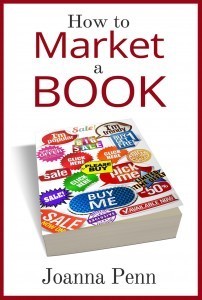 If you found this post helpful, I encourage you to check out Joanna Penn’s How to Market a Book, which covers marketing principles, short-term marketing, long-term marketing, and book launches. Click here to find out more and download a sample.
If you found this post helpful, I encourage you to check out Joanna Penn’s How to Market a Book, which covers marketing principles, short-term marketing, long-term marketing, and book launches. Click here to find out more and download a sample.
The post How to Sell More Books By Optimizing Your Metadata appeared first on Jane Friedman and was written by Joanna Penn.
July 4, 2013
WRITING ON THE ETHER: Should Authors Stop Linking to Amazon To Support Bookstores? by Porter Anderson
Table of Contents
Should Authors Stop Linking to Amazon?
Timing, and Interdependence
Chewing Each Other’s Legs Off
Mr. Smith Goes to Town
“Don’t Link to Amazon.” But She Does It.
Should Authors Stop Linking to Amazon?
I feel angry that these authors, unthinkingly or by design, have chosen to support Amazon, W H Smith or Waterstones without giving a fig for independent bookshops.
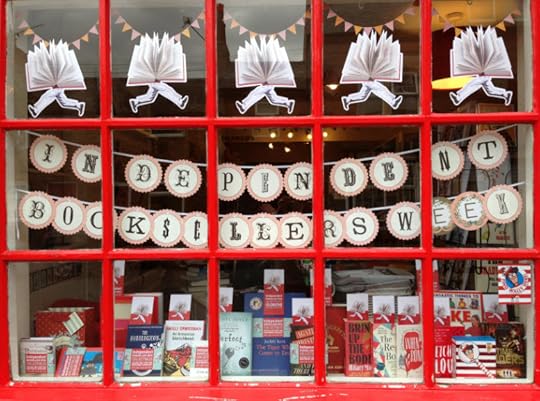
The Bookshop Kibworth, Leicestershire, decked out for Booksellers Week. IndependentBooksellersWeek.org.uk
Do you not “give a fig” for independent bookshops?
If you provide links to your Amazon sale pages on your author site, does it mean you don’t care about the future of your neighborhood bookstore?
If your Amazon Associates link gives you, as it does me, a small percentage of a sale that costs the reader nothing, are you in it because you’re ready to see the last bookstores close?
I’m guessing you’re answering no to these questions.
But that’s one reason this debate is so valuable. It’s one of those issues—like so many in the upended business of publishing—that has no villain, regardless of how harsh someone’s accusations may be.

Keith and Frances Smith
You’re hearing a strongly stated opinion here, yes, from bookstore owner Keith Smith, in an opinion piece at The Bookseller, headlined Action not words. His commentary seems to come from earnest frustration:
I speak as someone who has built up two profitable indies, but whose turnover has declined in the past couple of years, beset as we are not only by the general economic malaise and the infiltration of ebooks, but more significantly by undercutting from supermarkets, multiples [bookstore chains], and Amazon.
“The infiltration of ebooks” is an interesting phrase, isn’t it?
Do you remember hearing of a springtime petition drive in the UK in which independent booksellers were asking people to demand that Amazon pay more corporation tax there?

Mercy Pilkington
Mercy Pilkington at GoodEReader had a write on it in April as more than 150,000 petition signatures were in-hand: Change.org Petition to Require Amazon to Pay Tax Delivered to British PM.
Pilkington wrote, “The Smiths, bookshop owners since 2004 who now own two locations, started a petition in order to ask David Cameron to enact change to correct what they feel is a situation that allows a much bigger entity to benefit over the smaller businesses unfairly.”
Same guy you’re hearing from now. Keith Smith.
 He and his wife Frances own and operate Warwick Books and Kenilworth Books. Each shop is in the English town for which it’s named. Those towns are about 15 miles apart, Google Maps inform me. I don’t recall having the pleasure of seeing either town, but they’re near Coventry. I visited its bombed cathedral and radiant new one as a kid.
He and his wife Frances own and operate Warwick Books and Kenilworth Books. Each shop is in the English town for which it’s named. Those towns are about 15 miles apart, Google Maps inform me. I don’t recall having the pleasure of seeing either town, but they’re near Coventry. I visited its bombed cathedral and radiant new one as a kid.
Smith, the owner of these two bookshops, isn’t attacking Amazon this time. He’s attacking authors who make sales there.
Is this really the type of company and operation and morality that authors want to support? Because that is what they are supporting and every day they do so drives another nail into the coffin of the independent sector, which is now in desperate straits.

Roz Morris
Here’s an answer for him, from author Roz Morris, an Ether sponsor with a new book out, Nail Your Novel: Bring Characters to Life.
Morris just wrote up her positive experiences in working with independent booksellers in her own area in How Indie Authors Can Get Their Books Stocked in Bookshops at the Alliance of Independent Authors blog.
And in direct answer to Smith?
I don’t want to be unsupportive of Amazon. Without the tools and platforms they have made available, I would still be locked up by the gatekeepers. With their [Amazon's] algorithms, I’m finding readers. But if Mr Smith wants to stock my books and encourage his clientele to try them, I’ll add him to my list of recommended suppliers.
Morris is hardly alone. Many authors see Amazon as their biggest friend, not simply a richer sales venue than the shop down the lane—and absolutely not as their enemy.
Smith, this time, has turned on people of his own business—the essential people, authors, the creators of the stories without whom neither of his bookstores means a thing. What a gamble.

Alison Weir
When my Bookseller colleague Lisa Campbell followed the Smith column with authors’ reactions in Anger over authors’ website links to Amazon, historian and author Alison Weir—a seller of more than 2.3 million books—gave her an extensive response that includes these lines:
The fact remains that publishers can shift large quantities of books through Amazon, W H Smith, Waterstones and the supermarkets, which are their main clients. Amazon also pays authors on their associates programme fees based on the number of books sold. Authors do have a living to make and Amazon can provide a great source of income which, sadly, independent book shops could not possibly meet. I understand the concerns of independent booksellers…But accusing authors like me…of not ‘giving a fig’ for independents is not only ignorant but untrue; I think my deeds over the years give substance to my words.”
And here’s a question no one seems to want to hear: why do folks like Smith and others want all or nothing? As Morris’ comments ask by implication, what is the advantage to authors in trading Amazon links for local-store options? Shouldn’t every entrepreneurial writer pursue every possible avenue for sales, meaning the biggest possible online retailer and local independent booksellers? (Update: You’ll see author Victoria Noe raise this question in our comments below.)
@DonLinn @philipdsjones it’s clutching at straws at best & downright offensive to authors when most not even making a living out of books
— Sam Missingham (@samatlounge) July 4, 2013
Timing, and Interdependence
Smith lodged his post at The Bookseller to time with the UK’s Independent Bookseller Week. That celebration continues through this Saturday with special events. Here’s Kealey Rigden‘s Independent Booksellers Week: 29th June – 6th July from the Telegraph, lots of details.

Ruth Ozeki
The Booksellers Week site includes plenty of pictures from shops’ activities on this page. And some of the warmest commentary about the importance of independent bookstores comes from author Ruth Ozeki. She is the winner of the Independent Booksellers Week Book Award for her A Tale for the Time Being. In her own post at The Bookseller, Keystone species, Ozeki writes with candor and power:
My books are not easy to describe or categorise. People have told me this. They are ungainly things that seem to fall between genres and unwittingly confound the machinery of mass marketing. The way books like mine find their way into readers’ hands is through word of mouth and the kind of personal and patient hand-selling that independent booksellers are famous for, and I’m grateful for this. But my gratitude is about more than just my particular books finding readers. Books like mine exist in the niches and at the edges of our cultural ecosystem, and without independent booksellers to hold open a place for them on the shelf, they would be far less likely to get written.
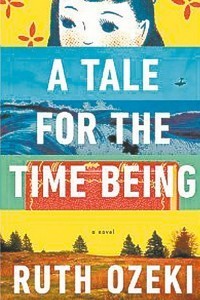 Her headline, “Keystone species,” she explains this way:
Her headline, “Keystone species,” she explains this way:
Independent bookshops are the keystone species of our cultural ecosystem. When they are endangered, the other species are imperiled as well. When they flourish, so do we all.
I’m not sure that some wouldn’t want to argue with that. The artist, the author, may be one step more fundamental in this ecosystem than the store. The store has nothing to sell without the author. But Ozeki is making a good play here. She’s going for the symbiosis of it all, of course:
Luckily, we know this somehow. Independent booksellers are an adaptable and resilient lot, and readers and writers are loyal and stubborn, and together we form a strong relationship of symbiotic mutualism.
It’s impossible not to wonder if comments of such grace and sincerity as Ozeki’s might not do far more good for independent bookstores than Smith’s cutting criticism of the authors on which those stores depend. Back to Table of Contents 
Chewing Each Other’s Legs Off
Ironically, Smith says he doesn’t care much for Independent Booksellers Week (IBW). It just keeps getting better, doesn’t it?

Željka Marošević
In a Q&A with the perennially anti-Amazonian Melville House‘s new UK presence—Independent Booksellers Week: Q&A with Keith Smith from Warwick and Kenilworth Bookshops—Smith tells Željka Marošević:
I feel really guilty about this, but we put on so many events throughout the year, and so many promotions, IBW doesn’t really fit into our program. It’s the wrong time of year, it’s too amorphous… I would much rather have an International Book Day as in Spain. And whilst I’m moaning I absolutely hate World Book Night and refuse to participate. Giving away hundreds of thousands of cheap books that look cheap, but which the middle-classes snap up ‘cos they always want something free…where’s the sense in that?
It would seem that not even the “middle-classes” are safe from Smith’s treasure chest of complaints.
@philipdsjones Totally hypocritical from MHP, as usual, since they are distributed by Random House and sell to AMZN themselves. @samatlounge — Don Linn (@DonLinn) July 4, 2013
And while some US bookshop owners might line right up for a special nationwide week of attention, do remember that the UK’s Independent Bookseller Week had a peculiar preface this year, when the American author and Nashville bookstore owner Ann Patchett was asked to make some comments.
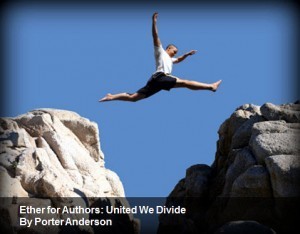 Her advance remarks to Campbell and her Bookseller associate Joshua Farrington touched off loud protest among many entrepreneurial authors. We covered the rough patch Patchett put herself through in Ether for Authors: United We Divide at Publishing Perspectives. No need to drag ourselves through that one again, thanks.
Her advance remarks to Campbell and her Bookseller associate Joshua Farrington touched off loud protest among many entrepreneurial authors. We covered the rough patch Patchett put herself through in Ether for Authors: United We Divide at Publishing Perspectives. No need to drag ourselves through that one again, thanks.
There was what might be called respectful coverage this week—maybe even muted coverage this week?—of her frequently recounted bookstore-opening story. Patchett has contributed a version of that story to Booksellers Week festivities as a one-time hardcopy, The Bookshop Strikes Back.
There is a polite piece on it in the Guardian by Liz Bury. Her short article is Ann Patchett flies flag for indie bookshops with her own store. The “Strikes Back” essay is here, in an edition run by The Atlantic in November of last year, should you care to read it.

Ann Patchett
And would you like more of Patchett’s excellent work? (I’m a fan.)
Easy: Here is her author page. On Amazon.
To writers, I’d recommend in particular her Kindle Single, The Getaway Car.
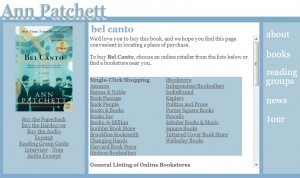
From AnnPatchett.com
And since Smith has put before us the question of how good authors link to retailers on their sites in the age of the Seattle Satan, go to Patchett’s own site and check her best-known title, Bel Canto.
You’ll find that she offers links to many retailers, including Amazon, Barnes & Noble, and many specific stores—but there seems to be no link to her own shop. Not even in a dropdown that lists many independent stores.
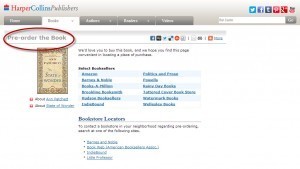 Check State of Wonder. Even on the book’s page at HarperCollins, there is no listing of Patchett’s own bookshop, Parnassus.
Check State of Wonder. Even on the book’s page at HarperCollins, there is no listing of Patchett’s own bookshop, Parnassus.
In fact, HarperCollins does not seem to realize that it released the book on June 7, 2011. The page there says “Pre-order the book.” I’ve helpfully circled that for you on our screengrab.
Nothing messed up about publishing today, is there?
Not to worry. That’s why you have the Ether: Parnassus Books in Nashville. Cheers, Ann.
Celebrate Independent Booksellers Week today & buy Ann Patchett’s ‘The Bookshop Strikes Back’ – for just £1.99 http://t.co/L2uYeKEWxV #ibw
— Foyles Bookshop (@Foyles) June 29, 2013
Mr. Smith Goes to Town

Diana Kimpton
Neither the comforts of Booksellers Week nor the endlessly traveled story of the author-who-started-a-bookstore-in-Nashville-so-there seem to have afforded Smith any particular cover in chasing authors around the Internet. Paul St. John Mackintosh’s coverage at Teleread in Anti-Amazon links bashing in The Bookseller brings new bout of bathos, picks right up on the comments at The Bookseller of author Diana Kimpton. 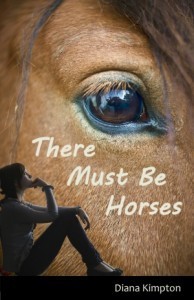 Her response is long and detailed, firmly rejecting Smith’s reading of the corporation tax issue that has embroiled not only Amazon but also Starbucks and other companies in the UK. Kimpton writes, in part:
Her response is long and detailed, firmly rejecting Smith’s reading of the corporation tax issue that has embroiled not only Amazon but also Starbucks and other companies in the UK. Kimpton writes, in part:
Yes, [Amazon] does organise itself in a way that minimises its tax bill but paying tax in Luxembourg on profits made in the UK is absolutely legal under EU rules and seems quite similar to the equally legal system authors like myself use when we pay tax in the UK on profits made in the US.

Joanna Penn
And while this mention of UK authors’ sales in the US has come up, I’ve checked again with Ether sponsor and self-publishing author Joanna Penn—who has just released her new How To Market a Book, by the way. Penn confirms that she still sees 95 percent of her fiction ebook sales and some 70 percent of her nonfiction ebook sales made in the US. She is, she notes, primarily an ebook author and what print copies she does sell are produced by Amazon’s CreateSpace. 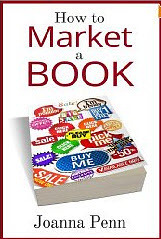 In a case like hers, Smith’s proposal that an author use local-store links instead of Amazon links would mean walking away from most of her sales. Her American readers would need to board transatlantic jets and travel to her selected nearby shops in London to buy her work. And yet, here is Smith in his piece at The Bookseller:
In a case like hers, Smith’s proposal that an author use local-store links instead of Amazon links would mean walking away from most of her sales. Her American readers would need to board transatlantic jets and travel to her selected nearby shops in London to buy her work. And yet, here is Smith in his piece at The Bookseller:
The Booksellers Association should contact all authors immediately and ask them to stop supporting Amazon directly.

Nick Harkaway
And a traditionally published author? Nick Harkaway, whose most recent title, Angelmaker, is from Random House, says:
I think bookshops asking authors to support them over the dominant force in the marketplace is not a good scene. A much more interesting approach is to ask what indies can do for authors to become their natural home, and the answer is probably that an independent book shop can become the sole point of sale for, say, line-and-signed books and other author stuff. Cut the author in at a decent rate and be a real partner, justifying the higher price with unique access. I think a straightforward “back us over them because we’re nicer” is a mistake.
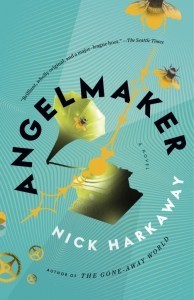 Harkaway may be putting his finger on the issue when he mentions partnership. For all the agonies of the digital disruption in publishing, we continue to see riffs open inside the industry! the industry! like this one between a main who rails against “the behemoth that is Amazon” and the authors who do business with it. What does Amazon do for authors? Kimpton:
Harkaway may be putting his finger on the issue when he mentions partnership. For all the agonies of the digital disruption in publishing, we continue to see riffs open inside the industry! the industry! like this one between a main who rails against “the behemoth that is Amazon” and the authors who do business with it. What does Amazon do for authors? Kimpton:
Amazon runs an excellent website that it built up for years at a loss while everyone else laughed. It has constantly improved during the 14 years we have been Amazon Associates, and it has won customers’ confidence and loyalty by offering good service. It helps people discover books they might never find otherwise, and it keeps backlist titles selling long after the bricks and mortar shops have taken them off the shelves. It has also done more than anyone else to create the current ebook market and, by opening up viable methods of self publishing, it has given authors new freedom to turn down the low royalties and restrictive contracts many publishers are offering these days.
Can the slow death of the independent bookstore be halted? http://t.co/sKGIHJwKg5 — David Keller (@drkeller84) July 4, 2013
In an energetic exchange of comments that follow Smith’s post, writer Marc Cabot reflects some of the values to authors of Amazon’s sales capacity this way:
I’d be glad to link directly to your store. You in return will promise to keep every single one of my books in stock at all times and recommend them to anyone who buys or expresses interest in a similar book, of course?…How about you agree to stay open 24 hours a day, seven days a week, 365 days a year and sell my books to anyone who wants one, any time they want one?…You just promise to give me 35% of cover price for every copy you sell, net forty-five. Unless I’m in your country. Then it’s 70%. That’s fair, right?…What I’m hearing is that I have some nebulous, undefined but extremely important moral responsibility to take away custom from the entity that treats me and every other author on Earth better than any author has ever been treated by a publisher or retailer in, well, the history of Mankind, and give it to you.
@JonnyGeller Oo, I say! That’s a little pointed. — GrumpyAndSneezy (@AnneHodgson0) July 4, 2013
Bookseller Smith, again, from his original post:
We put a lot of effort into supporting authors, promoting their work, diligently hand-selling, inviting them to our festivals and “meet the author events”. Not many of us work less than six days a week often seven in doing so. It’s about time they supported us.
Morris again, from her comments to me:
Of course we care about bookshops – the ones I know are a valuable hub for booklovers in the community. But I’m not going to nanny readers about where they choose to buy. That’s their choice. All I can do is present them with the options. If you want to buy in a bookshop, here’s the one I’d love you to support if possible. If you want to buy online, thank you for considering my work and here are your options. No author can afford the kind of boycott Keith Smith is suggesting.
And lest we leave this as simply a squabble in the back room of the shops, a bit more has just come in. Back to Table of Contents
.@ozekiland receiving her Independent Booksellers’ Week Award from the wonderful @jaffeandneale. #ibw13 pic.twitter.com/wVfAuPsCdZ — canongatebooks (@canongatebooks) July 3, 2013
“Don’t Link to Amazon.” But She Does It.

Lisa Campbell
As dawn arrives on the American Independence Day, Bookseller Week in the UK has featured a debate at Southbank Centre.
The event overnight was titled “The Perfect Storm; Why Bookshops Are in the Frontline for the Battle for the High Street.”
The good Campbell at The Bookseller duly reports on it today in Trade debates high street for IBW.

Lindsay Mackie
Comments include English PEN board member Lindsay Mackie.
She’s quoted talking of a “market with a society attached onto the side of it,” of “neo-liberalism (as) the primary of an unregulated market” and of a need to prevent the United Kingdom “rocketing towards a powerless society.”

Anne Sebba
But the more colorful comments come from Anne Sebba, chairwoman of the Society of Authors, quoted saying:
I think there are some things authors can do and the first thing they can do is take that button off their website which says ‘buy from Amazon’—it doesn’t need to be there.
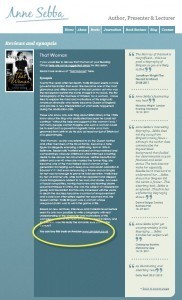
Anne Sebba exhorts authors to “take that button off their website which says ‘buy from Amazon.’” But you’ll find — I’ve circled it on this screengrab of 4 July 2013 — a link for just that, buying at amazon.co.uk, on her site’s book pages, including this one about her fine Wallis Simpson book, That Woman.
It’s interesting that Sebba’s own site includes Amazon links for sales of her books, isn’t it?
They can be seen at the bottom of the synopsis of her book, That Woman, and on other book pages.
And Sebba’s remarks (her Amazon author page is here for you) may have revealed at least as much about the suspicion and dislike many in the publishing community still harbor for ebooks as about their concern for how today’s books are sold.
She’s quoted as saying:
Publishers need to make a point about the physicality of books, something which makes us feel “this is a wonderful object.”
What comes of so much of this is a better understanding of how wide the spectrum is in terms of digital recognition, acceptance, and adoption.

Gordon Wise
Even within the business, there are vast distances between the view of a Society of Authors chairwoman who asks her authors to give up their largest sales venue and the comments of Curtis Brown agent Gordon Wise, who, Campbell tells us, seems to have tried to point out some limitations of that “physicality” when it comes to a bookstore and the range of what it can stock.
Wise also spoke to the practical issues facing an industry that some don’t seem to realize is already global:
We have all got to fight extremely hard to keep our place at the table. Publishers will find it is very difficult to keep individual relationships with all these shops. Why aren’t there more regional alliances of booksellers?
The debate may have ended at Southbank but it’s far, far from over.
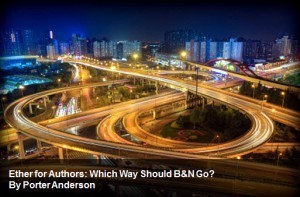 I’ve focused here on the UK conversation because it cropped up as a feature of the British Independent Booksellers Week.
I’ve focused here on the UK conversation because it cropped up as a feature of the British Independent Booksellers Week.
But, of course, these issues have riled many in the US bookselling community for years.
And with Barnes & Noble facing what appears to be an increasingly uncertain future—there’s something of that for you this week in Ether for Authors: Which Way Should B&N Go From Here?—we could soon see a re-sharpening of these questions, as we did during the collapse of Borders.
Morris, meanwhile, would at least like Smith of Kenilworth and Warwick to know that bookshop workers aren’t the only ones doing some long hours:
I’d like to point out that authors work at least six days a week too. If Mr. Smith thinks otherwise, he can’t know many authors.
And tell me now, what do you think? Is it thinkable for authors to cast off from the biggest marketplace for their work in history at the behest of beleaguered merchants? Or are we approaching a point at which the digital dynamic will so profoundly revise the business that the point will soon become moot? Have at it. And, if on the left side of the Atlantic, happy Fourth. Back to Table of Contents
11 Childhood Memories of the 4th of July http://t.co/S1o6yb8T8j — Mashable (@mashable) July 4, 2013
Main image: iStockphoto – TriggerMouse
The post WRITING ON THE ETHER: Should Authors Stop Linking to Amazon To Support Bookstores? appeared first on Jane Friedman and was written by Porter Anderson.
July 3, 2013
Best Business Advice for Writers: June 2013 by Jane Friedman
Best Business Advice for Writers is a monthly link round-up where I share the best online articles focused on the business of writing and publishing. Share any best reads you’ve found lately in the comments.
How to Make Bookshops Love You and Your Book by Vanessa Robertson (@Ness_Robertson)
This is an article by a former UK-based bookseller, offering excellent and practical insights into how to build a good relationship with indie bookstores, which can play a significant role in word of mouth for your book. Click here to read the article at State of Independents.
Two Writers Who Are Killing It on Twitter by Dr. B (@BookRiot)
If you feel unsure about your Twitter use, take a look at two authors who provide good role models—full case studies at BookRiot.
Author Concerns and Complaints at Crimson Romance by Victoria Strauss (@victoriastrauss)
Even if you’re not working with Crimson Romance, even if you’re not writing romance, even if you think this could never apply to you, I encourage you to educate yourself about what type of contracts (and problems) might be involved with digital-only imprints. Click here to read the full story at Writer Beware.
21 Things You Need to Know About Self-Publishing 2.0 by James Altucher (@jaltucher)
Some of the most frequent questions I receive are about self-publishing. Here’s a good primer that provides a manageable overview for the new writer. Read the full post at Copyblogger.
What Do Self-Published Authors Need by Hugh Howey (@HughHowey)
This is a good compliment to the post above. Visit bestseller Hugh Howey’s site.
E-Books and Profitability by Brian DeFiore (@DeFiore)
A literary agent discusses the prevailing e-book royalty rate for traditionally published authors and why it’s problematic. Click here to read the full post at AAR Digital Views and Right Klatch.
Promotional Activities Market to the Three Cs: Creators, Channels, Consumers by Mike Shatzkin (@MikeShatzkin)
This post is an industry deep-dive on the marketing practices of traditional publishers. I find it invaluable and insightful as a long-time industry observer (and player), and think it’s a must-read for authors, too. There’s a bit of jargon, but I know you can handle it. Read the full post at Mike Shatzkin’s blog (and subscribe to it while you’re there).
The post Best Business Advice for Writers: June 2013 appeared first on Jane Friedman and was written by Jane Friedman.
Jane Friedman
- Jane Friedman's profile
- 1882 followers



